

Why MBA – A 5-Step Process to Answer this Essay Question

Depending on the way you look at it, this can be a highly technical or philosophical question.
There can be two reasons for you to look for the ‘why MBA’ answer: you’re either wondering how to answer the why MBA SOP question or you’re wondering why to do MBA in the first place.
In either case, you’ve come to the right place.
This is a seriously tricky question. There can be no right or wrong answer, because after all, this is a subjective question. Yet, somehow, you’re expected to give an answer that appeals to the AdComs.
How would you know what the AdComs want you to say?!
Don’t worry, we know. And we’re about to tell you, too!
In this article, we will discuss:
Why MBA is Important
How to write the “why mba” essay.
- Are you ready for an MBA?
This article will attempt to answer all your questions around doing an MBA degree.
This profoundly philosophical question is so complicated that people fail to find answers even after getting an MBA. Heck, it makes the Kennedy assassination look like an open and shut case.
So, seriously. Why is an MBA important?
To find the answer, firstly, let’s look at what an MBA helps you achieve. An MBA is, at best, a “general management” program. It is not a specialization even if you choose to take up some electives during the second year.
In short, an MBA makes you a ‘generalist’.
And that’s a good thing! Here’s why:
Let’s presume that after completing your MBA, you get to be a CEO, CIO, CFO, CTO… in short, any CXO.
Your MBA will have equipped you with general tools and tricks of the trade, so you can manage multiple teams of specialists.
At that level, you don’t need to know the nitty-gritties of Company Law or the fundamentals of Bookkeeping, but you do need to know how those affect your business in a general sense.
You need to be able to pick up a balance sheet or a P&L statement and go a step beyond the obvious to figure out subtle implications.
You are not expected to understand each account the marketing team is handling, but you should be able to look at a sales graph and understand what is going right, and more importantly, what is going wrong.
This is exactly what an MBA prepares you to do.
There’s another huge reason why MBA is important:
If you get your MBA from a top school, it adds a lot of weight to your credentials and it gives you a fantastic opportunity to develop a global professional network.
For example, someone from IIM-A need not “prove” himself as hard as someone from say Mahaveer Jain Institute of Management Studies.
An MBA from a top institute instantly grants you the credibility that takes any average MBA graduate years of hard work to earn.
Quite often, people tend to go in for MBAs because of two reasons: they hate their current jobs or they want to make more money.
Most times, it’s a combination of both.
In any case, you can’t put this in a statement of purpose for MBA. Honestly speaking, you shouldn’t really opt for an MBA for such superficial reasons, either.
You need more grounded, well-thought-out reasons, like these Top reasons to do an MBA .
There can be many more reasons that may prompt people to pursue an MBA. Generally, if you think about it enough, it tends to boil down to one of these seven reasons.
After you have figured out in your head why you want to do an MBA, you need to get down to writing your statement of purpose for MBA. Invariably, you will encounter one variant or another of the question, “Why MBA?” in your MBA Application essays.

Am I Ready for an MBA?
Now, we’d like to move on to talking about that doubt you might have in the pit of your stomach.
It’s all good and dandy to be taking the GMAT and applying to B-Schools because you think you need an MBA but are you in the right place in life to take the most out of the MBA experience?
Even after you find the appropriate reason to do an MBA and make it sound very convincing on paper, you might be wondering if this is the right time for an MBA.
Don’t worry, most people have this question in their minds.
An MBA is a huge decision. It would be abnormal not to question whether you’re doing the right thing at the right time. It’s kind of like getting married, in a way. You will ask yourself if you’re truly ready for it even when you’ve got the perfect partner, the perfectly planned wedding, the perfect life – the doubt is totally expected and normal.
Having said that, you shouldn’t dismiss this doubt when it comes to your mind.
It’s worth putting some more thought into the game. After all, the more you think about this, the more convinced and confident you will be at your MBA interview. That, in turn, will raise your chances of getting an admit.
The answer to, “Am I ready for an MBA?” won’t just come to you out of the blue because it is not just a feeling. It is a decision.
Like every major decision in life, choosing to pursue an MBA requires determination. It comes with lots of self-doubt and uncertainty. You need to have the strength of character to put aside your insecurities and doubts and maintain a clear mind that is ready to live fully in the present.
You’ll be able to make the best of your MBA journey if you’re able to put everything else aside and focus 100% on the experiences and learning opportunities that your MBA will bring your way.
So really, the only thing you need to know in order to decide whether you’re ready for an MBA is whether you’re capable of being fully present and aware of everything surrounding you.
If you’re not, give yourself the opportunity to develop that ability.
If you are, there can be no better time for you to go get that MBA.
All the very best on your MBA journey.
Do let us know your thoughts, experiences, and questions in the comments section below.
Is Your Profile Good Enough For An MBA
Talk To Your Advisor[ninja_form id=]
How to Answer the "Why an MBA?" Essay Question
A common essay and interview question of top business schools, admissions committees want to know why you're choosing to get an MBA. Here is one expert coach's insight into crafting a compelling response.

By Cyrus H.
Posted May 10, 2024

Featuring Charlotte W.
MBA Admissions Strategy Office Hours
Starting tuesday, july 9.
5:00 PM UTC · 45 minutes
Table of Contents
There are a lot of things to think about when preparing your business school applications, but one stands out more than the rest: why do you want to get an MBA? It may seem like the question is obvious, but it’s often neglected and it’s important to have a cohesive answer before starting to put together your application.
Why It’s Important to Know Your Motivations for Business School
You may be wondering why you need to have an answer to this. Isn’t it sufficient that you’re motivated enough to apply? The answer is no, it’s not. Admissions committees want to admit students who really want to be there and will contribute to the program. Business school is a huge investment–both in terms of money and time–so you need to ensure that it makes sense in your long-term goals.
The word counts for application essays are pretty limited and understanding why you want an MBA will help you make the most of every letter. You’ll have an easier time sharing relevant past experiences, learnings, and stories that all tie into your future goals.
Also, thinking about “Why an MBA?” will help you understand a lot of your previous decisions in context, like why you picked the jobs you did, where you see yourself in five years, and what values are important to you.
It’s easier to be more confident in your decisions, and convey that confidence to the AdComs, if you know why you’re pursuing business school in general and the particular program specifically. You’ll have an easier time telling a compelling story and conveying a unique candidacy.
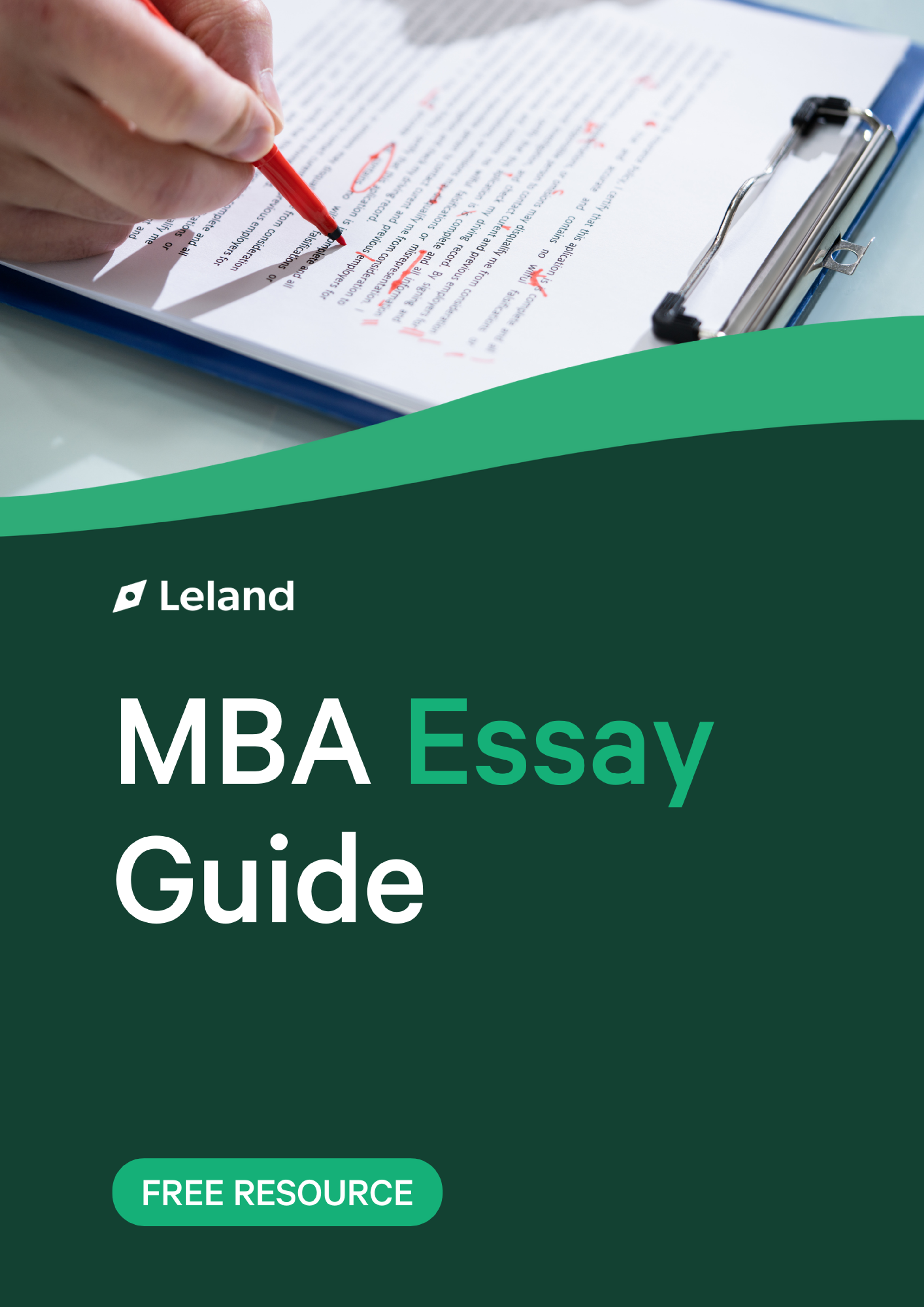
The Ultimate MBA Essay Guide
Download our free guide on the MBA essays for school-specific deep-dives and examples
How to Start Answering This Question for Yourself
At the end of the day, getting to know your motivations for pursuing an MBA is an exercise in getting to know yourself. You can start from either the past or the future, whichever you find the most helpful.
From the Past
First, ask yourself why you made the choices you have so far. Write out some of the most impactful decisions in your life and what they show about your values and aspirations. Think about common themes and patterns that connect the different points in your work experience and educational journey thus far. Don’t be afraid to go all the way back to childhood; this should not be a 15-minute exercise, but rather a days-long process.
From the Future
Picture yourself at age 80 in a rocking chair contemplating your life. What are the most precious memories and achievements that you would want to share with your grandkids? What will you reminisce about the most? What would make you think that you’ve made the most of your time on Earth? Is it a financial, social, or political goal? There is no wrong answer, as long as it remains true to who you are.
If you’re not certain, it’s okay. You don’t need to have a completely solidified twenty-year plan; simply give the AdCom an idea. It’s more important that you show initiative and ambition than a step-by-step roadmap of your career path.
Whatever you choose to write about, make sure that you are being vulnerable. Personal elements help the reader get to know you and your story. The essays are the one part of the application that is completely within your control and portray a human, rather than a list of accomplishments.
Almost everyone applying to an M7 degree program will have a stellar resume and it will be a lot more difficult to stand out there than in your essays. Remember that your essay may be the fiftieth one that the admissions committee member is reading that day. How can you make yours remain interesting and stand out, even when the reader is tired and at the end of a long day? Dig deep, and spend a lot of time reflecting on your story.
Free trial!
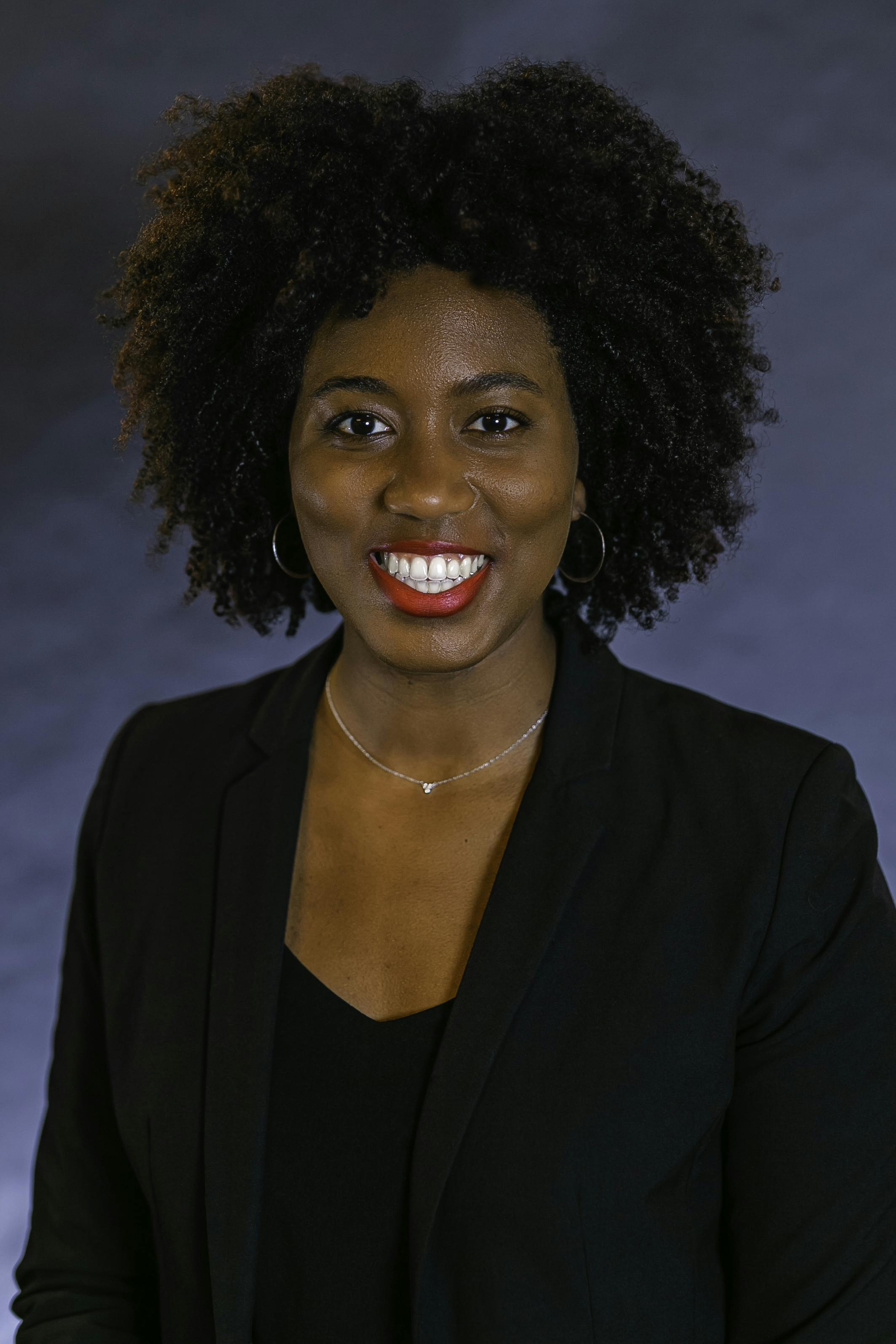
From 120 top coaches
Access a library of videos, templates, and examples curated by Leland’s top coaches.
Example essays.

Example Resumes

Application Prep

Video Courses

Be comfortable with knowing that your “why” is not set in stone and can change. In fact, it will very likely evolve entirely throughout your MBA program and after graduation. It doesn’t need to be grandiose, but rather what uniquely motivates you.
My grandma used to say, “I don’t care that much what path you pursue; but, whatever you do, be passionate about it and try to excel.” This advice applies perfectly to your business school applications.
Don’t seek pity or sympathy and don’t try to come off as the smartest or most accomplished applicant. Neither of these tracks is likely to translate into a compelling application. Stay true to yourself and write from the heart, rather than focusing on what you think the AdCom wants to hear.
Understanding why you want to get a business graduate degree is the first step toward submitting a cohesive application, and the importance of spending time on reflection is not to be underestimated.
Get Expert Help on Your MBA Essats
If you’d like personalized guidance on any part of the MBA application process, I’d love to work with you on Leland. I’ve been coaching for ten years and am passionate about helping others become the best versions of themselves. Head to my profile and book a free intro call to get started.
Browse hundreds of expert coaches
Leland coaches have helped thousands of people achieve their goals. A dedicated mentor can make all the difference.
Browse Related Articles

March 12, 2024
What Do You Actually Learn in Business School?
A current MBA candidate at Harvard Business School provides an inside look at what you actually learn in business school.

May 4, 2023
Why ChatGPT Can’t Write Your Personal Statement
While ChatGPT is multifaceted, there is a compelling argument against using AI for your personal statements. Here is one expert's take on the revolutionary technology and application essays.

May 5, 2023
What GPA Do You Need to Get Into Graduate School?
How much does your college GPA actually matter to graduate programs? How high of a GPA is "good enough"? A former Director of Stanford Graduate Admissions addresses the importance of GPAs to higher ed. degrees.

May 11, 2024
Craft a Powerful Essay for Stanford GSB: What Matters Most & Why?
A GSB MBA, expert admissions coach, and pro writer, outlines his top advice for nailing the challenging and broad Stanford essay prompt, to help you get into one of the most prestigious MBA programs in the world.

March 13, 2024
The 5 Best Classes at Stanford's Graduate School of Business
An overview of the top 5 classes at GSB, from an expert coach and Stanford MBA.

February 3, 2023
How I Nailed My MBA Interview and Gained Admission to Top 10 Business Schools–An MBA Interview Checklist for Success
A list of things to do before your MBA interview to help you prepare answers to the most common questions and gain admission to a top program, written by an expert Leland coach and Kellogg MBA.
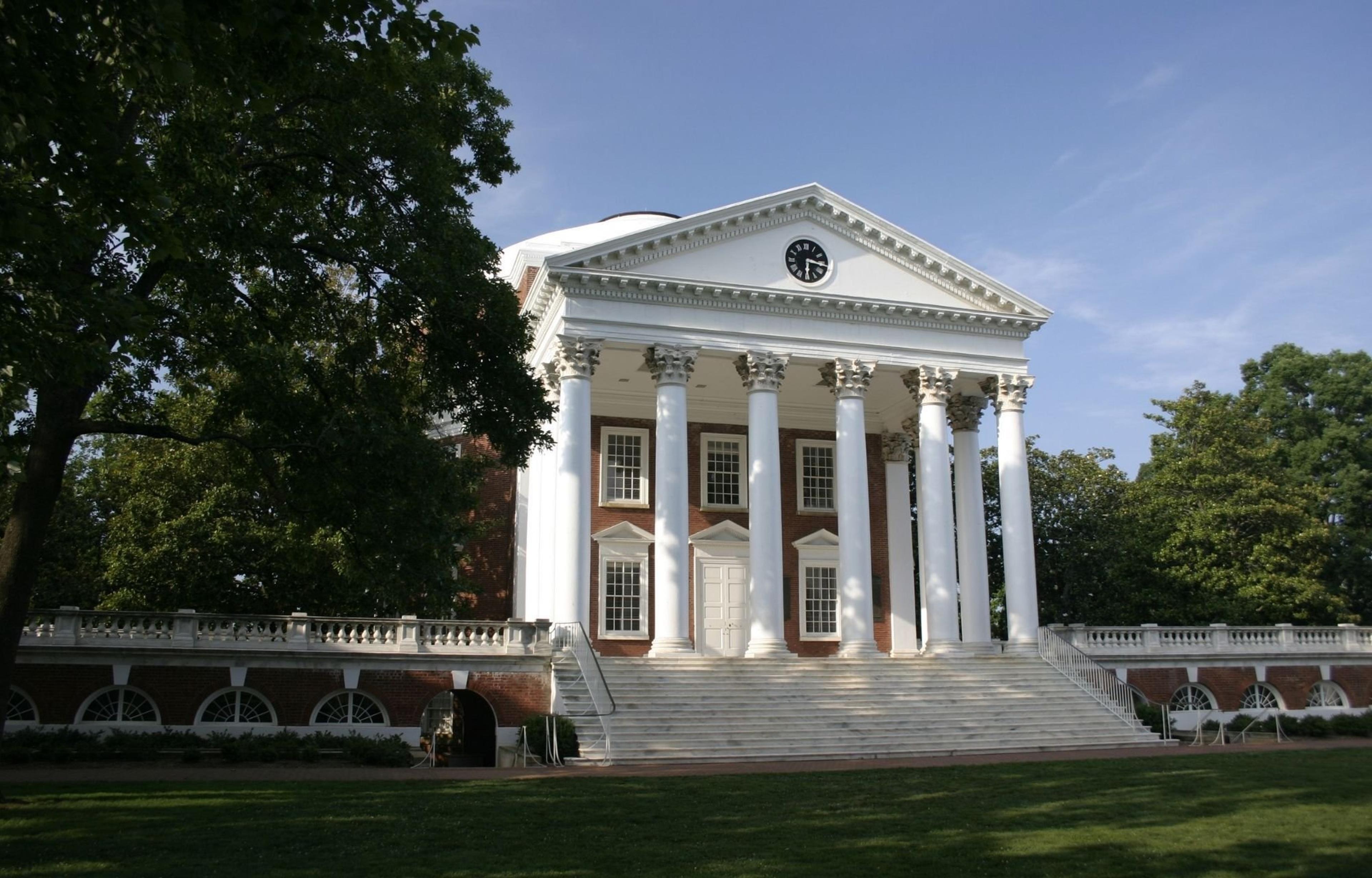
Networking & Glamour: Pre- and Post-MBA Advice
A Darden MBA and Leland application expert gives post-MBA transition advice, tips for those considering an MBA, and her business school story.

Not Every MBA Program is Made Equal–An Overview of the Program Structures of Top Business Schools
The program structures of the top 15 business schools, including the number of credits and courses required for graduation, the percentage of electives vs. core classes, the proportion of required classes, and more.

Is Grad School Right for You?
Explore the benefits and drawbacks of pursuing a master's degree with this expert guide that will help you determine whether it's the right course for you.

40 Reasons to Hire an MBA Admissions Consultant
A list of benefits that admissions coaches can bring to MBA applications, from identifying skills, to helping you choose the right goals, and providing a network, and more.

My Stanford GSB Acceptance Journey: Navigating Imposter Syndrome and Handling Setbacks
Applying to an M7 program from a non-target undergrad institution can be daunting. Here is how one applicant navigated the process and got into Stanford GSB.

January 26, 2024
5 Expert Tips for the "Why Stanford?" MBA Application Essay
Discover 5 expert tips to help you craft a compelling "Why Stanford?" MBA application essay that sets you apart from the competition.

MBA Resources
Top Insightful Strategies to ace your “WHY MBA essay”: A consultant review

MBA & Beyond Team
14/11/2023 | 8:18 pm
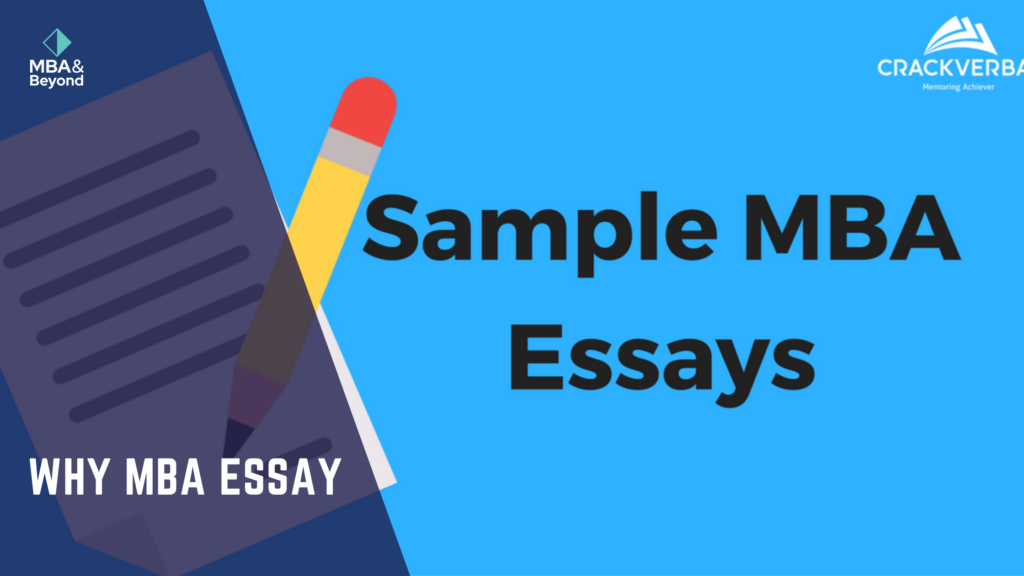
Essays are vital in your business school application, serving as a key gateway to convey your aspirations and suitability. The ‘Why MBA’ Essay Answers specifically provide the admissions committee with a detailed understanding of your reasons for pursuing an MBA, your career objectives, and how an MBA from their school aligns with your goals. This essay also signals to potential employers your readiness and fit for the business world, underscoring the importance of clarity, conviction, and alignment in your response.
An excellent ‘Why MBA’ Essay requires many strong aspects to weave your story together. That is why, together with our experts, we are here to provide some premium tips on how to develop a killer ‘Why MBA’ story.
Here is the Snapshot of the article:
WHY SHOULD YOU ACE THIS ESSAY?
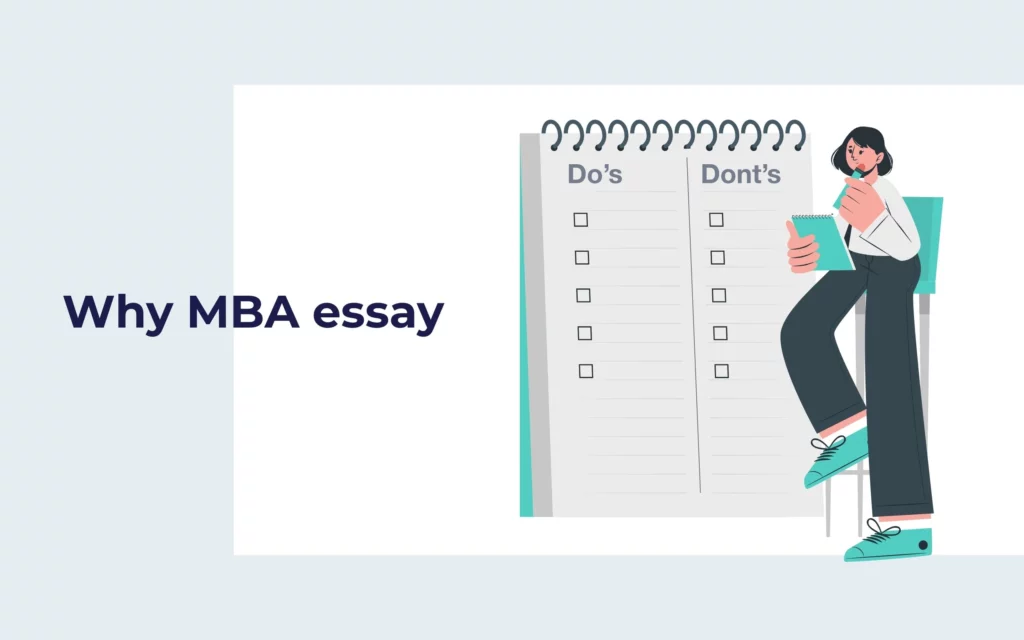
This question addresses the majority of the questions that the adcom may have about you, which is why ‘WHY MBA’ is critical to answer in order to gain the attention of the adcoms that are reading your essay.
While the question is good, the information provided by applicants is generic. The goals they mention are vague and ineffective. You want to make money, learn new things, and become a leader. So, who doesn’t like it? The question is w what motivates you to pursue an MBA?
Now, what are the reasons why you should ace the ‘WHY MBA’ essay?
Control/Responsibility
Control and responsibility come only when the firm’s top management is confident that you understand the business principles and can handle them; this comes from prior experience and knowledge obtained while pursuing the MBA; this is ” WHY MBA. “
Connections
An MBA connects you with a diverse and intellectual group beyond your everyday work environment, thereby fostering valuable networks, especially in fields you’re passionate about. Consequently, high-quality MBA programs assemble individuals from varied backgrounds, offering unmatched learning experiences.
While applicant motivations differ, the core of the “WHY MBA” question is to explain how an MBA promotes personal growth and fills educational or experiential gaps uniquely, requiring thoughtful reflection before you articulate your response.
While answering the why MBA question, it is critical to consider the post-MBA objectives and get to know them. We have a full essay on Strong Post-MBA Goals Essay Sample.
How to frame practical post MBA goals essays?
STRUCTURE OF A WINNING ESSAY FOR “WHY MBA”
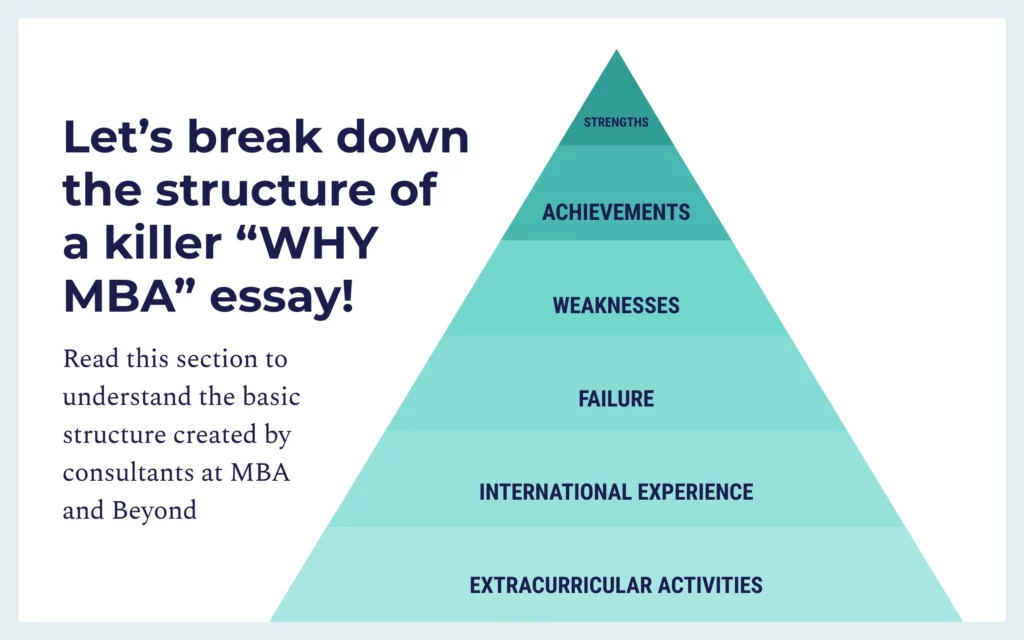
Crafting a well-defined structure proves invaluable in compiling comprehensive information about a candidate’s background, MBA and beyond designed this basic structure for individuals wishing to write a killer MBA essay
1) Strength
The admissions committee evaluates your personality, credibility, and alignment with their b-school community based on the strength of your stories. Thus, conveying your authentic self in essays is both vital and challenging. This segment aims to support you in articulating your strengths in a captivating and compelling manner, resonating with admission officers.
Want to pursue an MBA but not sure if your profile fits?
Talk to our Profile Experts to know your chances for a top MBA Program.
How to address your strengths? Click here to know more!
2) Achievements
The primary reason many strong applicants are not admitted to top business schools is their inability to effectively communicate the significance of their stories. This segment is designed to help you choose your most compelling stories and articulate them in a manner that optimizes your potential across all your applications.
3) Weakness
Addressing your weaknesses proves to be the most challenging aspect of your application. Many candidates falter in this area because they often misunderstand what admissions authorities seek to learn about their weaknesses. Weakness stories should focus on how you navigated a situation rather than dwelling solely on the context or the events that transpired.
How to address your weaknesses? Click here to know more!
Incorporate no more than one or two weaknesses, ensuring you go beyond mere acknowledgment. It’s crucial to offer a reasoned justification rooted in your future aspirations. Ask yourself why you seek to change a particular aspect and consider how this transformation aligns with your goal of personal growth.
Do you realize there’s a fine line between weakness and failure? What is that fine line, and how can you explain your shortcomings so that you project a good and influential personality in your essays? Weaknesses are dynamic and evolve over time, while failure tends to be more fixed. It showcases the challenges you’ve overcome and highlights your distinctive qualities.
5) International experience
In a business school, the learning extends beyond professors to encompass valuable insights gained from classmates. Hailing from diverse backgrounds, these peers play a crucial role in shaping your educational experience. Admission authorities are keen to understand your ability to showcase your value in such a varied and dynamic setting.
Suggested Reading: What do Business schools mean by International Experience?
6) Extracurricular activities
The extracurricular area provides a chance to demonstrate the colorful, dynamic personality that b-schools want. However, what should you highlight in this section if you’re not engaged in organizational activities? Even if you have, which ones should you choose to make the greatest influence on the admissions committee?
Extracurricular activities should have two characteristics: For starters, it personally enriches you. Second, your ECs should have some communal effect.
What is the role of Extracurriculars activities in your MBA applications? Click here to learn more
Your post-MBA short-term and long-term ambitions are critical in creating a cohesive picture for the admissions committee.
If you are unable to establish clear connections between your job experience, short-term goals, and long-term ambitions, there’s a potential risk of compromising your admission prospects to a top MBA program, even with an otherwise stellar profile.
Suggested reading: How to frame practical post MBA goals essays? Strong Post MBA goals essays Sample
Every business school asks “Why MBA?”—a question many candidates struggle with. We’ve broken it down: Checklist 1.0 focuses on your current skills and role, while Checklist 2.0 envisions your future post-MBA. The MBA serves as the bridge from 1.0 to 2.0, shaping your answer to “Why MBA?” and outlining the skills you’ll gain to evolve into your future self.
Suggested Reading: How to build your MBA application ?
Let’s look at an example with a table
| | |
|---|---|
| Leader (5/10) | Global Participative Leader (10/10) |
| Empathy (8/10) | Empathy (10/10) |
| Initiatives (4/10) | Entrepreneurship (9/10) |
| Relationships (6/10) | Relationships (10/10) |
| Confidence (7/10) | Confidence (9/10) |
| Convincing Skills (3/10) | Convincing & Negotiations (8/10) |
| Adaptability (6/10) | Adaptability- Committed to Change (10/10) |
| Inquisitiveness | |
| Team Member |
Our product assists applicants in writing a powerful essay with impactful “Why MBA” Essay answers by filling in the holes that applicants overlook. Additionally, our product is free to use and provides a framework that anybody can use.
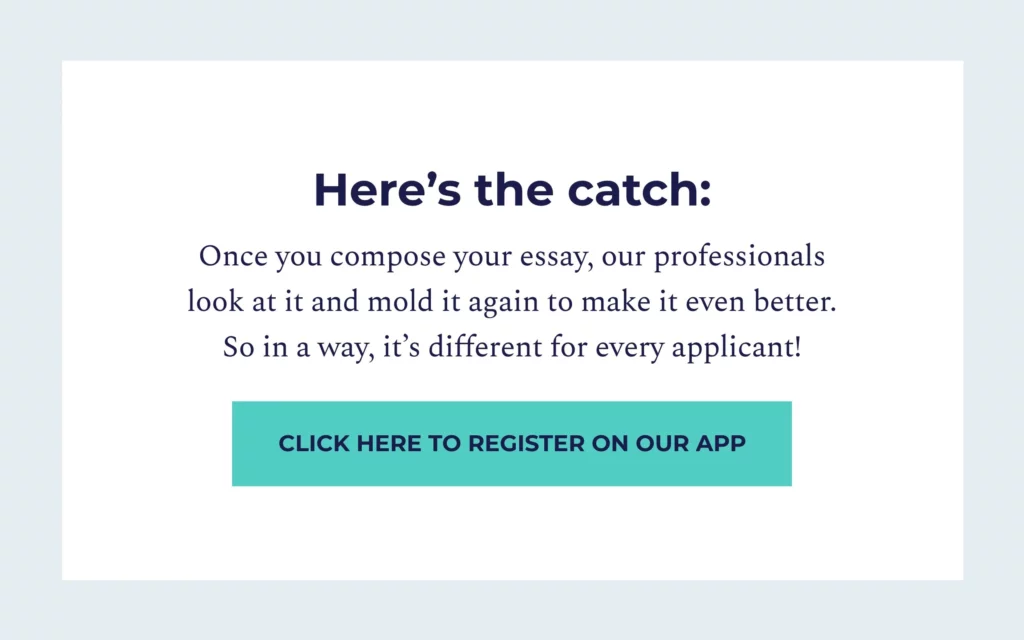
DO’S AND DON’T WHILE WRITING THIS ESSAY
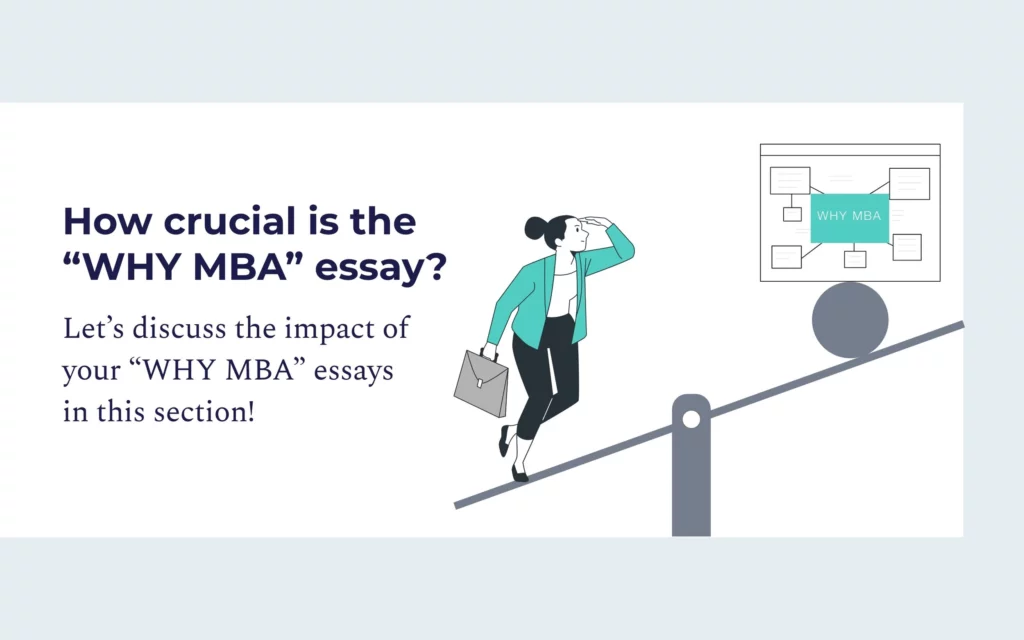
Crafting essays, particularly “Why MBA” Essay answers, is vital for articulating your thoughts and shaping the admissions committee’s perception of you. Moreover, these essays go beyond academic achievements, authentically reflecting your response to the ‘Why MBA’ question, helping to paint a comprehensive picture of your motivations and aspirations for pursuing an MBA before your interview.
1) Tell your own story – Everyone aims to stand out and make a memorable impact, particularly through “Why MBA” Essay answers. Remember, this essay should reflect your unique voice, a trait only you can genuinely convey.
2) Be truthful- Admissions officials, like it or not, are like lie detectors. They have a keen ability to discern the distinction between an authentic candidate and one attempting to deceive.
3) Tell them about the Goals – Share your objectives and elucidate how an MBA can contribute to realizing those goals as your “Why MBA” essay answers.
4) Why you are the best fit for the school – Admissions officers will want to know why after you’ve selected to attend a specific business school.
5) Research – Research provides a distinct advantage, and numerous expert guidance websites (such as MBA and Beyond) offer essential information and recommendations for crafting a ‘WHY MBA’ essay.
6) Practice your essay- Don’t be concerned about the word limit while composing your essay. Initially, put down all your thoughts on paper without worrying about refinement.
DONT’S
1) CV is not your essay. – Transforming your CV into an essay is not advisable. The admissions committee is already aware of your academic and professional achievements through your resume. Now, they seek to gain deeper insights into your personality and understand your motivations for pursuing an MBA.
2) A sob story is not always an option – Using a sob story to elicit sympathy is not an effective strategy for gaining attention unless it directly addresses the question. Otherwise, it may create a negative impression of you in the eyes of the admission committee.
ESSAY EXAMPLES
Despite highlighting the do’s and don’ts, applicants often make errors in their essays. To assist, we provide examples of successful candidates admitted to top B-schools. These examples can guide you in assessing your standing and applying the mentioned principles systematically.
INSEAD Success story essays
This is an example in which we requested candidates to compose the essay without any aid and then assisted them in identifying gaps and filling those gaps with appropriate remarks. Click here to access
Different colleges pose distinct essay questions, and responding uniquely to each is key to navigating the process successfully. For instance, Kellogg, INSEAD, and Darden each emphasize different aspects in their requirements.
EXAMPLES OF GOOD “WHY MBA” ANSWERS
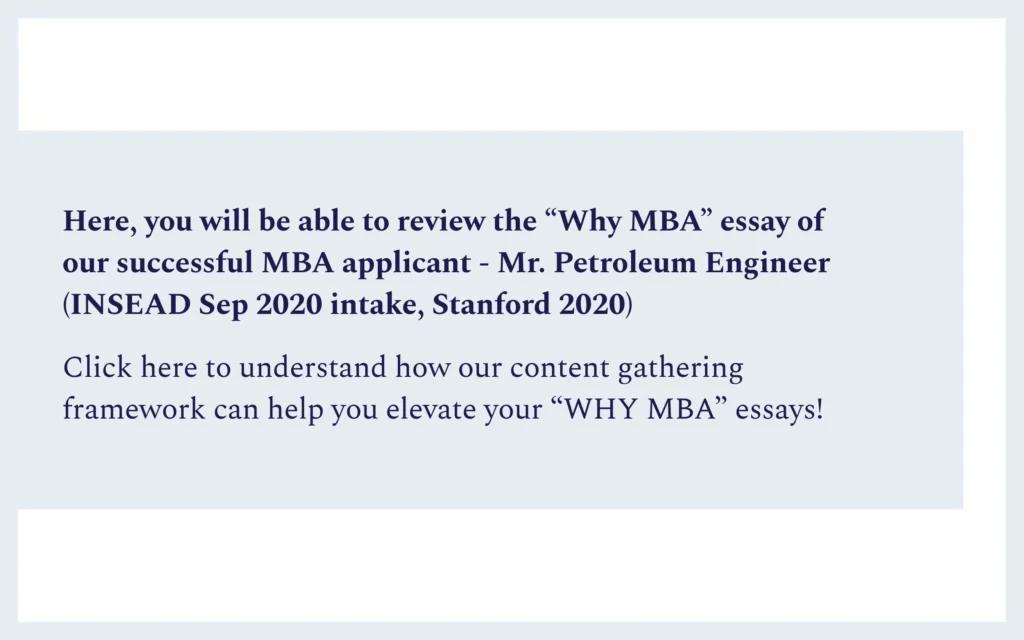
*An MBA will help me grasp how firms operate and are controlled. My long-term objective is to become a company’s CFO with a whole perspective of the entire firm. My Undergraduate degree has given me a solid foundation in accounting and finance. An MBA will teach me strategy, marketing, international business, law, and the necessary soft skills to be a successful corporate leader.*
Though grades, courses, and test scores are crucial, essays, particularly “Why MBA” Essay answers, can distinguish you in your application. They offer a direct connection with admissions officers, addressing critical questions like “Why MBA?” and why you choose a specific school. Consequently, these essays significantly impact Adcoms, showcasing your commitment and aligning your aspirations with the MBA program’s offerings, thereby illustrating your dedication to the school once admitted.
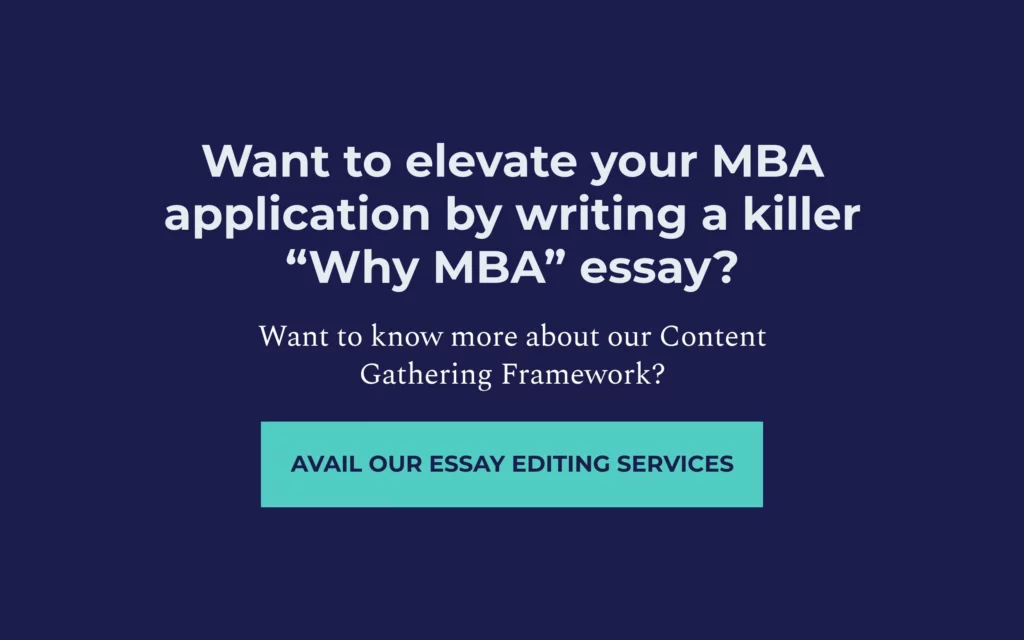
We believe in every applicant’s ability to complete the application process, which is why we developed a product designed to aid applicants in essay writing. Our experts help identify gaps and guide them in crafting a compelling essay that stands out.
So, schedule a call with us today and have our experts point out your gaps so you can fill them with something concrete. Book a free evaluation call with our experts now.
Frequently Asked Questions
Why are you doing an MBA answer?
This is a question that every business school asks, and only a few MBA applicants can answer it. This has been broken into two sections: checklist 1.0 and checklist 2.0. MBA is necessary to bridge the version 1.0-to-version 2.0 gap. This gap serves as your answer to the question, “Why MBA?” This response will help you realize the necessity for an MBA and acquire the skills needed to become version 2.0.
How do you conclude an MBA essay?
– Link your conclusion and your introduction.
– Include a surprising twist.
– Be unique to stand out.
Leave a Reply
Your email address will not be published. Required fields are marked *
Articles You Might Like

Should an International Candidate go for an INSEAD R3 MBA?

Top MBA programs starting in January 2025
Upcoming Events

Mastering your MBA Application
July 11, 2024 | 9:00 pm – 10:00 pm
UPCOMING EVENT: Mastering your MBA Application. Register now
- Exam Prep >
- Prepare for Business School >
- Business School & Careers >
- Explore Programs >
- Connect with Schools >
- How to Apply >
- Help Center >
- About the Exam
- Register for the Exam
- Plan for Exam Day
- Prep for the Exam
- About the Executive Assessment
- Register for the Executive Assessment
- Plan for Assessment Day
- Prepare for the Assessment
- NMAT by GMAC
- Shop GMAT™ Official Prep
- About GMAT™ Official Prep
- Prep Strategies
- Personalized Prep Plan
- GMAT Mini Quiz
- Executive Assessment Exam Prep
- NMAT by GMAC Exam Prep
Prepare For Business School
- Business Fundamentals
- Skills Insight
Business School & Careers
- Why Business School
- Student Experience
- Business Internships
- B-School Go
- Quiz: Are You Leadership Material?
- MBA Return on Investment (ROI) Calculator
- Estimate Your Salary
- Success Stories
- Diversity and Inclusion
- Women in Business
Explore Programs
- Top Business School Programs
- Quiz: Which Post Graduate Program is Right for You?
- Quiz: Find the Best Program for Your Personality
- Business School Rankings
- Business Master's Programs
- MBA Programs
- Study Destinations
- Find Programs Near Me
- Find MBA Programs
- Find Master's Programs
- Find Executive Programs
- Find Online Programs
Connect with Schools
- About GradSelect
- Create a GradSelect Profile
- Prep Yourself for B-School
- Quiz: Can You Network Like An MBA?
- Events Calendar
- School Events
- GMAC Tours Events
- In-Person Events
- Online Events
How to Apply
- Apply to Programs
- The Value of Assessments
- Admissions Essays
- Letters of Recommendation
- Admissions Interviews
- Scholarships and Financing
- Quiz: What's Your Ideal Learning Style?
Help Center
- Create Account
- How To Apply
Top Five Tips for Writing Compelling MBA Admissions Essays
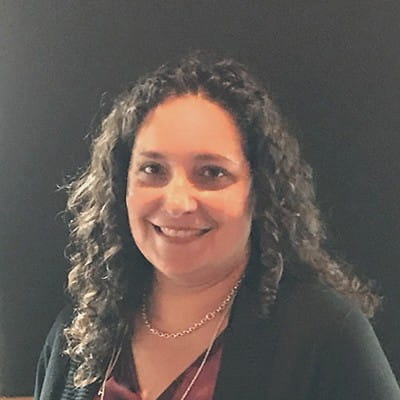
Erin Wand - Personal MBA Coach
Erin Wand is an mba.com Featured Contributor and the Vice President of Marketing and Operations for Personal MBA Coach , a boutique MBA admissions consulting and tutoring firm.

For many of the business school applicants I work with, the MBA admissions essay is the part of the application they dread the most.
Does that sound like you? It doesn’t have to be! If you’re unsure about how to start on your MBA admissions essays, don’t worry. This is your opportunity to move beyond your GMAT exam scores , GPA, or resume and reveal something deeper about yourself to the admissions committee. Read along for my best MBA admission essay tips.
Crafting winning MBA admissions essays
The question is: how to you write MBA admissions essays for top-tier programs that stand out from the stack and effectively tell your story? Here are five tips for compelling essays that will stick in the minds of the admissions committee and help you get into your top choice business school program.
1. Stay focused and answer the question asked
It’s surprising how often candidates write beautiful essays but do not answer the question. While I certainly endorse thinking outside of the box and considering the “why” behind an essay prompt, first and foremost you must answer the question.
Business school applicants like you are often highly accomplished, and it can be tempting to try to include as many of the details of your accomplishments as possible into your essays. It’s crucial that you avoid this urge and focus on the specific question at hand.
2. Less can be more: be succinct
A trend I’m seeing at many leading full-time MBA programs is shorter essay word limits. Michigan Ross , Stanford GSB , UCLA Anderson , and Duke Fuqua are just a few of the programs that have reduced their essay word counts in recent admissions cycles. This trend underscores a key piece of advice: be succinct!
Remember, your essays and short answers are just one part of your application. In addition to the details you’ll provide on the application form itself, you’ll also submit an MBA resume ( check out my resume tips here! ). This allows admissions committee members ample opportunity to read about everything you have accomplished, all the roles you have held, and the awards you have won. There is no need to fit every detail into your essays.
Instead of squeezing in as much as you can, focus on sharing a few key highlights, peppering in some interesting details, and convey your authentic voice through your writing. This is your chance to explain your choices, show your accomplishments, and share your passions. The fewer things you try to cover in your essays, the more you will be able to achieve this objective.
3. Be authentic, not what you think schools want to hear
I can’t emphasize this enough: do not write what you think admissions committee members want to read! The qualities and experiences that make you unique are your greatest selling points. Each essay should paint a clear picture of who you are, what motivates you, and what you’re passionate about.
Related to this, don’t feel compelled to show how you fit the mold that seemingly makes up the “ideal” candidate. If you have no desire to run a non-profit, that’s okay! If you’re not motivated to save the planet, don’t pretend you are! The admissions committee will see right through this, and you could end up doing more harm than good. Instead, focus your energy on simply being authentic.
4. Keep your language approachable and focus on the “so what?”
The terms you regularly use at the office may be foreign to others, including admissions committee members. When in doubt, do not assume the reader is familiar with everything about your job. Admissions directors come from all backgrounds and fields and are not assigned to candidates with similar backgrounds. They do not know the ins and outs of your industry and do not need to. In fact, details and accomplishments that are significant only to someone in your industry are less compelling than understandable results and transferable skills.
Everyone from your grandmother to a professor of microfinance should be able to understand your essays. So even if your accomplishment would be extremely impressive to another engineer or investment banker, if the reader doesn’t understand the “so what,” you’re wasting your words.
5. Limit the amount of flowery prose
Remember: You’ re not submitting your essays for a Pulitzer Prize. All you’re trying to do is tell your story. While of course you want your essays to be well-written and free of grammatical mistakes and typos, you also want them to be relatable and easy to follow. They should also convey why you are someone others would want to study with, learn from, and eventually be inspired by. That type of person is human and down to earth. Your essays should show this.
Erin Wand is an mba.com Featured Contributor and the Vice President of Marketing and Operations for Personal MBA Coach , a boutique MBA admissions consulting and tutoring firm.
Founded by a Wharton MBA and MIT Sloan graduate who sits on the Association of International Graduate Admissions Consultants Board of Directors, Personal MBA Coach has been guiding clients for 14 years and is consistently ranked #1 or #2, currently holding the #1 ranking in the US on Poets&Quants.
We help clients with all aspects of the MBA application process including early planning, GMAT/GRE/EA tutoring, application strategy, school selection, essay editing and mock interviews. Our team includes a former M7 admissions director and former M7 admissions interviewers.
Last year, our clients earned more than $6M in scholarships!
This site uses various technologies, as described in our Privacy Policy, for personalization, measuring website use/performance, and targeted advertising, which may include storing and sharing information about your site visit with third parties. By continuing to use this website you consent to our Privacy Policy and Terms of Use .
COVID-19 Update: To help students through this crisis, The Princeton Review will continue our "Enroll with Confidence" refund policies. For full details, please click here.
7 Common MBA Essay Questions and How to Tackle Them

There are a handful of business school essay questions that seem to capture the heart and imagination of many an MBA program.
It seems that, across the board, admissions committees feel these queries offer the best insight into the minds of their applicants. You are likely to see a version of one or more of these common MBA essay questions on your b-school application . These tips will help you craft the perfect answer.
1. Describe your specific career aspirations and your reason for pursuing an MBA.
This may be the most important essay question you tackle. You must convince the admissions committee that you deserve one of their few, cherished spots. Reference your background, skills, and career aspirations, demonstrating how this degree is a bridge to the next step in your professional life. Be sure to speak to how this particular program will help you realize your potential.
It's okay to present modest goals. Deepening your expertise and broadening your perspective are solid reasons for pursuing this degree. If you aspire to lofty goals, like becoming a CEO or starting your own company, be careful to detail a sensible (read: realistic), pragmatic plan.
Read More: Find Your Business School
2. What are your principal interests outside of work or school? What leisure and/or community activities do you particularly enjoy?
There's more to b-school than the library. The best programs buzz with the energy of a student body that is talented and creative and bursting with personality. These students are not just about case studies and careers. Describe how you will be a unique addition to the business school community.
B-school is also a very social experience. Much of the work is done in groups. Weekends are full of social gatherings or immersion experiences, and the networking you do here will impact the rest of your career. Communicate that people, not just your job, are an important part of your life.
3. Who do you most admire?
The admissions committee wants to know the qualities, attributes and strengths you value in others and hope to embrace. Drive, discipline and vision are fine examples but try and look beyond these conventional characteristics. Tell a story and provide specific examples. If you choose someone famous (which is fine), remember that you risk being one of many in the pile. Instead, consider a current boss, business associate, or friend. Know that your choice of person is less important than what you say about him or her.
4. Describe a situation in which you led a team. What challenges did you face, and how did you overcome them?
The committee isn't looking to see how you saved the team through your heroic efforts (so put yourself on ego alert). They want to see how you helped foster an environment in which everyone contributes, illustrating that the sum is greater than its parts. B-schools like leaders, but they like leaders who can help everyone get along and arrive at a collaborative solution.
You should shift gears for this question. Almost the entire application process thus far has asked you to showcase "me-me-me." Now the focus of your story needs to be on the "we" and how you made the "we" happen.
5. Our business school is a diverse environment. How will your experiences contribute to this?
This essay gets at two concerns for the admissions committee: (1) how will you enrich the student body at this school and (2) what is your attitude toward others' diverse backgrounds?
Diversity comes in many shapes. If a grandparent or relative is an immigrant to this country, you can discuss the impact of his or her values on your life. Perhaps you are the first individual in your family to attend college or graduate school. Maybe you are involved in a meaningful or unusual extracurricular activity. Whatever you choose to write, it's vital that you discuss how it contributes to your unique perspective.
6. Describe a personal achievement that has had a significant impact on your life.
Don't pull your hair out just because you haven't founded a successful start-up or swum across the English Channel. Smaller accomplishments with a lot of personal significance are just fine if they demonstrate character, sacrifice, humility, dedication, or perseverance. A good essay describes how you reached a personal objective and what that meant to you. Maybe you didn't lead a sports team to a victory. Maybe the victory was that you made it onto the team .
Read More: 20 Must-Read MBA Essay Tips
7. Discuss a non-academic personal failure. What did you learn from the experience?
Many applicants make the mistake of answering this question with a failure that is really a positive. Or they never really answer the question, fearful that any admission of failure will throw their whole candidacy into jeopardy. Don't get crafty. You should answer with a genuine mistake that the committee will recognize as authentic.
Write about a failure that had some high stakes for you. Demonstrate what you learned from your mistake and how it helped you mature. This is a chance to show b-schools your ability to be honest, show accountability, and face your failures head-on.
Practice for the GMAT
Take a GMAT practice test with us under the same conditions as the real thing. You'll get a personalized score report highlighting your strengths and areas of improvement.
START A FREE PRACTICE TEST
- Business School

Find MBA Programs Matched to Your Interests
Explore our featured business schools to find those that are looking for students like you.

Top Online MBA Programs
On a mission to increase your salary? Our Top 50 Online MBA ranking is based on academics, career outcomes, tech platforms, and more.

Best Career Prospects
Find out which schools have the best track records for getting students jobs—and the highest starting salaries.

Top Schools for Entrepreneurship
Ready to build your own business from the ground up? Check out these 50 graduate programs.

Free MCAT Practice Test
I already know my score.

MCAT Self-Paced 14-Day Free Trial

Enrollment Advisor
1-800-2REVIEW (800-273-8439) ext. 1
1-877-LEARN-30
Mon-Fri 9AM-10PM ET
Sat-Sun 9AM-8PM ET
Student Support
1-800-2REVIEW (800-273-8439) ext. 2
Mon-Fri 9AM-9PM ET
Sat-Sun 8:30AM-5PM ET
Partnerships
- Teach or Tutor for Us
College Readiness
International
Advertising
Affiliate/Other
- Enrollment Terms & Conditions
- Accessibility
- Cigna Medical Transparency in Coverage
Register Book
Local Offices: Mon-Fri 9AM-6PM
- SAT Subject Tests
Academic Subjects
- Social Studies
Find the Right College
- College Rankings
- College Advice
- Applying to College
- Financial Aid
School & District Partnerships
- Professional Development
- Advice Articles
- Private Tutoring
- Mobile Apps
- International Offices
- Work for Us
- Affiliate Program
- Partner with Us
- Advertise with Us
- International Partnerships
- Our Guarantees
- Accessibility – Canada
Privacy Policy | CA Privacy Notice | Do Not Sell or Share My Personal Information | Your Opt-Out Rights | Terms of Use | Site Map
©2024 TPR Education IP Holdings, LLC. All Rights Reserved. The Princeton Review is not affiliated with Princeton University
TPR Education, LLC (doing business as “The Princeton Review”) is controlled by Primavera Holdings Limited, a firm owned by Chinese nationals with a principal place of business in Hong Kong, China.
We are proud to be recognized by Poets & Quants as one of the top MBA admissions consulting firms in 2023!

- Let’s Talk!
MBA Essay Examples, Tips, and Analysis
Y our MBA application essays are your best opportunity to share meaningful life experiences that hide in the “white spaces” of the resume and to tell admissions officers not only “what” you have achieved but also “why” those achievements are meaningful to you.
Your MBA application essays are going to be crucial if you are competing for a spot at one of the world’s top business schools.
These resources will show you how to excel in the rigorous MBA essay writing challenges ahead of you, provide you with the guidance to create MBA essays that will impress admissions officers, and share MBA essay examples that illustrate our advice in action.
Second, we survey the five most frequently asked MBA essay questions. We preview video essay questions and link to detailed guidance on how to tackle this emerging class of application essays.
Third, we will teach you how to choose topics and stories for your essays and share a story-outlining technique to help you tell those stories.
Common MBA Essay Forms: Persuasive versus Narrative Essays
There are two primary forms that MBA application essays take: persuasive essays and narrative essays. In a persuasive essay, you must persuade your reader that your argument is a sound one. An op-ed column in a newspaper is one example of a persuasive essay.
The classic “What Will You Contribute to the Class?” question is an excellent example of a persuasive essay question that MBA programs like to ask. The essay you write must persuade the admissions committee that you will enrich next year’s class. You will generally present evidence from past experiences and achievements to support your claims about what you can offer the MBA community.
The other style of essay you’ll encounter in your MBA applications is the narrative essay. Certain MBA essay questions don’t sound like questions at all; they are, in fact, an invitation for you to tell a story. We refer to these as narrative essays – but others call them behavioral essays or expository essays.
The Leadership Story Essay is a perfect example of a narrative essay. It’s one thing to claim to be a leader – but it’s quite another to show the admissions committee that you’re a leader by telling a captivating leadership story in which you played the starring role.
While MBA essays often fall into these two categories, the actual prompts will differ from school to school. Let’s discuss the five most frequently asked MBA essay questions. ↑ To the Top
The Five Most Frequently Asked MBA Essay Questions
Every business school application requires you to answer one or more MBA essay questions. Although the essay prompts differ from application to application, we identified five types of MBA application essay questions that appear again and again.
Career Goals Essays
A career goals essay question regularly appears in one form or another on just about every MBA application. Even if you aren’t required to write this type of essay, you will almost certainly be asked about your post-MBA career goals during an admissions interview.
Admissions committees ask about your career plans because they want to understand what you aspire to do after your MBA and how the MBA degree fits into your career plan. As it turns out, a strong career goals essay is one of the best tools in your application to stand out from MBA candidates who don’t have a compelling career vision or haven’t effectively articulated their professional goals in their MBA application essays.
Leadership Essays
Leadership essays are your absolute best opportunity to convince MBA admissions committees of your leadership abilities. Remember that MBA admissions officers will be interested in your leadership achievements both inside and outside of work.
You probably won’t be asked directly, “Are you a leader?” Instead, you’ll be asked to tell stories about your leadership achievements. When given the opportunity, you need to supply evidence that you can rally other people and motivate them to work together to achieve an important shared vision or goal. Therein lies the objective of a great leadership essay.
Why MBA? and Why Our School? Essays
The “Why MBA? Why Our School?” essay is your chance to convince admissions officers that their school is the perfect fit for what you need from an MBA program. The best answers to these types of questions are both personal and specific. You need to effectively convey what you are looking for in an MBA program and tell the admissions committee why their school will best satisfy your learning goals and help you achieve your career development objectives.
“What Will You Contribute?” Essays
The “What Will You Contribute?” essay presents you with an opportunity to tell the MBA Admissions Committee why you would be a valuable addition to their incoming class. The schools are looking for candidates who can put in just as much as they take out. One critical thing to understand when preparing to answer these questions is that concrete and tailored answers about what you can contribute to each MBA program are crucial.
Professional Experience Essays
The professional experience essay is an executive summary of your career thus far. A resume is a record of jobs and achievements — a Professional Experience Essay provides the connections and interrelationships between those jobs and brings your resume to life. An effective Professional Experience essay will give the admissions committee a sense of the career decisions you’ve made, your major achievements in each step of your career, and the skills and knowledge you’ve acquired along the way.
MBA Application Video Essays
MBA admissions committees are increasingly relying on technology to help them evaluate and manage their growing applicant pools. MBA application video essays are becoming a popular tool, as MBA programs can use them to learn far more about candidates than the traditional application permits. In recent years, leading MBA programs including Kellogg Northwestern , MIT Sloan , and Chicago Booth have incorporated a video component into their evaluation process. Video essays are excellent screening tools that allow admissions officers to assess candidates’ professional presence and communication skills.
Free MBA Essay Writing Course
Please enter your email below to gain 30 days of free access to our MBA Essay Writing course. Learn about the five most frequently asked MBA application essay questions and access our brainstorming tools and sample essays.
No matter which type of MBA essay question you are tackling, your primary objective is to provide evidence that proves you possess the qualities that admissions committees value most. By doing so, you will move one step closer to an acceptance letter from a top business school.
Now that you have a better picture of the classic MBA essay questions you’re likely to face, let’s cover selecting the strongest stories to present in your MBA application essays.
How to Choose the Best Stories for your MBA Essays
Story selection is something all MBA applicants wrestle with. When you first read the MBA application essay questions, it may be hard to figure out which topics to cover or which of your stories to tell. We’ll explain how to go step-by-step to choose your best stories. Here are the steps:
Research the School’s Fit Qualities
Categorize the question.
- Brainstorm Topic/Stories
Choose a Topic or Story
To choose your best stories, you need to know what qualities MBA programs truly value when evaluating applicants. You want to tell stories that prove to the admissions officers that you possess the attributes they seek in MBA candidates. We refer to these as the school’s Fit Qualities . You might think of them as the highest-common denominators among the candidates who are accepted.
Early in your MBA essay writing process is the time to make some strategic choices about which qualities and strengths you will put front and center in your MBA essays. If you attempt to feature all of your strengths, you run the risk that admissions officers will finish your essays with no clear idea of any of them. Instead, select three or four of the qualities that your research tells you the school you are applying to prizes most of all.
Second, study the essay question to determine if it falls into one of the five essay categories discussed earlier in this article.
By categorizing each question, you’ll have a better idea of what the admissions committee will be looking for in your response. You’ll know the criteria for scoring top marks in that essay style, which will guide your application essay design decisions.
Brainstorm Topics/Stories
Third, you are ready to start brainstorming potential topics and stories. Remember that your central objective is to find opportunities to feature the key elements of your application strategy .
Here are some questions you can ask yourself to help you to choose your best topic or story:
Are you the star of the story or supporting cast?
With very few exceptions, you need to write stories where you play the starring role. Don’t make the mistake some applicants make of writing a thrilling story about their parents’ hardships and triumphs, leaving little room for their own.
Did the experience occur recently?
It is usually best to choose stories that happened within the last three years. If an older story is incredibly compelling, then keep it on your list. However, bear in mind that admissions officers are rarely interested in reading about your high school glory days.
Does the essay feature several Fit Qualities?
Review your topic ideas objectively and ask yourself if they exemplify the school’s Fit Qualities. Because you’ll be limited to telling only a few stories, you’ll want to choose the ones that feature a few different Fit Qualities if at all possible.
Once you have selected your best stories, it is time to create an outline to organize your thoughts before jumping into the writing process. ↑ To the Top
How to Outline Your MBA Essay Stories
The persuasive essay writing style is prevalent in university and work settings, so it may have been some time since you were asked to write a story. For that reason, we want to share a powerful outlining technique called the STAR framework that will help with the “story-telling” essays you may be asked to write in your MBA application.
The STAR framework is designed to help you tell a concise story with a beginning, middle, and end.
The “S” in STAR stands for Situation .
The Situation is the time, place, and context of the story; you can think of it as the setting, but it might also include the broader challenge or conflict you or your organization faced. In essence, this is the set-up of the story.
“T” in the STAR acronym stands for Task . The Task is your role and goal in the story. What were you expected to accomplish by the end of the story? An effective story has built-in conflicts and complications.
The Action of the story is what admissions officers are really interested in because this is their chance to see your strengths and qualities in action. While it won’t be necessary to write down every step you took at the outlining stage, you’ll want to jot down the highlights.
Below is an MBA essay example told using the STAR framework. It outlines a story written by a candidate who served as a donation chair for a fundraising event for a non-profit organization.
Task: Assigning specific jobs to committee members, checking on their progress, helping teammates meet agreed-upon deadlines for obtaining the donations, and offering other assistance
Action: Motivated my team by having them meet Literacy Now children. Assigned tasks and checked in regularly. Successfully mediated team disputes. Visited 20 restaurants and called 12 wineries. Ensured deadlines were met.
Sample MBA Essays: MBA Applicant Beware!
MBA Prep School’s guide is replete with essay writing tips, and we do provide excerpts from sample essays to illustrate the most common MBA essay categories. However, while you will find page-after-page of helpful advice and building blocks for constructing your own original MBA essays and stories, we don’t publish an extensive catalog of MBA essays written by MBA Prep School’s past clients.
The problem with collections of sample MBA application essays is that they can mislead you into thinking that if you can just replicate one of those sample essays, you’ve got your golden ticket into business school. Unfortunately, the opposite can be true. The reason those essays “succeeded” is because they were an integral part of a complete story about an impressive human being whom the admission committee concluded belonged at their business school.
And the scary truth is that reading MBA essay examples might even harm your chance of admission for several reasons:
1. They might stunt your creativity and ability to express yourself. If you are trying to mimic someone else’s essays – the content, the style, or the approach – your story and voice are likely to get lost in the process. Admissions committees want to be impressed – but they want to be impressed by you. Feature the traits and tell the stories that depict “you” at your best.
2. Sample MBA essays can undermine your confidence in your MBA candidacy. The essays that get published as samples are often truly eye-catching, dramatic, and sensational – stories of exceptional accomplishment, rare feats, or extreme obstacles. It may seem, in comparison, that none of your stories stack up. The good news is that the whole package is what matters, not a single defining moment in a candidate’s life.
The last thing you need is to doubt your abilities or have a crisis of confidence when you’re trying to put pen to paper (or finger to keyboard). Trust in your own experiences and tell stories about what you – and only you – will bring to the MBA program.
3. Admissions officers can tell when you’ve “sampled” from sample MBA essays. The pesky thing about MBA admissions committees is that they’re filled with brilliant people who know how this game is played and what resources are available. They can spot themes and clichéd stories inspired by sample essay collections. More importantly, they can sense when you’re telling someone else’s story or when the story doesn’t ring true to your MBA application’s other elements. Don’t give an admissions officer reason to doubt your authenticity by risking even the appearance that you “sampled” from MBA sample essays that are swirling around on the Internet.
At MBA Prep School, we work with clients we believe in and help them tell their stories, not someone else’s. Remember that the MBA application process is not a storytelling contest; even if it were, the winners would be chosen based on the authenticity, originality, and integrity of the stories they tell!
Final Thoughts
Critics of MBA essays often wonder if they still have a place in the application process when admissions committees can rely on quantitative data points to choose among applicants. However, your transcripts, test scores, and resume are historical documents that only tell a fraction of the story. Your MBA essays represent a powerful opportunity to communicate your goals, strengths, reasons for applying, and potential contributions to the class.
The process of writing MBA essays provides you with a rare opportunity for self-examination and self-expression. Many applicants value the introspection required of them in the MBA essay-writing process and find they can better articulate their strengths and goals during their subsequent MBA interviews as a result. By putting ample thought and effort into brainstorming and writing your MBA essays, you will almost certainly increase your odds of being accepted to a top MBA program.
Related Articles: Essay Examples
- Career Goals Essay Example
- What Will You Contribute? Essay Example
- Why MBA? and Why Our School? Essay Example
- Leadership Story Essay Example
- Professional Experience Essay Example
- MBA Video Essays
- Consulting Terms & Conditions
© 2024 Prep School Media LLC. All Rights Reserved.
- MBA Admissions
- ISB Admissions
- MBA Application Tips
- MBA Essay Tips
- Business Schools
Expert MBA Essay Tips and How to Write a Great MBA Essay
Admit expert.
- MBA Application Tips , MBA Essay Tips
- April 27, 2024
Writing an MBA essay can be a pivotal step in your journey towards earning a coveted spot in a top business school. It’s a chance to let your personality shine, communicate your goals, and explain why a particular institution is the perfect fit for you.

In this comprehensive article, we delve into the importance of MBA essays, the various types you might encounter, expert MBA essay tips, and provide a roadmap for crafting impeccable B-School essays. Whether you’re pondering “Why MBA and Why Now?” or tackling the intricate “Why this Business School?” question, we’ve got you covered. Dive into the world of MBA essays, where your aspirations and abilities find their voice.
The Importance of MBA Essays
Types of mba essays , how to write a great mba essay, 10 common mistakes to avoid while writing mba essays .
- How we’ll help you write amazing essays
MBA Essay – FAQs
MBA essays are a perfect opportunity to showcase your strengths and explain any weak points in your application. A well-written essay can provide context to a low GMAT score or GPA, but strong numbers will never make up for a weak essay.
Renice Jones, Ex. Assistant Director of Recruitment and Admissions at Schulich MBA program rightly said:
“Candidates who are below average can use the other components of the application, such as the essays, to exhibit why they may be a great fit for Schulich.”
MBA essays also become very important if you are from an over-represented pool of candidates, such as an Indian male IT/software engineer. Like you, many candidates will have similar work profiles and experiences. You cannot change your work experience but can make sure that you portray your spikes to the admission committee through your essays.
Stanford MBA admissions committee gives this advice to its applicants every year,
“There is no typical Stanford MBA student, no ideal for applicants to chase. Our advice is to just focus on you and ensure that your application is a true reflection of yourself.”
MBA Essays – A way to showcase your personality
A compelling MBA essay helps the Adcoms get a peek inside your personality. Chad Losee, HBS Managing Director of MBA Admissions and Financial aid, pointed out that their primary goal in the essay is to get to know you better. The decisions you have made, your motivations, or any formative experiences. However, you must not shy away from your personality in the process.
The MBA admissions team at Yale School of Management held a webinar , where they talked about what they are interested in knowing through its essay.
How to impress the MBA admissions committee in the admissions events. Here are a few tips in this article .
Yale SoM MBA essays are generally open-ended, like – “Describe the biggest commitment you have ever made.” For this essay question, the admissions committee is interested in knowing how you approach commitments and the behavior that supports them. It can be a personal or a professional story, as long as it is something distinctive to your life and helps them know more about your personality.
It is the story that you put together about your passion, experience, goals, and how business school fits into that mix that sets you apart from other candidates.
Looking for expert help for MBA essays?
At Admit Expert, we have helped hundreds of students get into top MBA programs around the world. We would be happy to help you too. Schedule a free call with us today to learn more about our services and how we can help you achieve your goals.
Schedule a free call
Although the MBA admissions essay questions differ across schools, they tend to evaluate you based on who you are, what you have done, and what value you can add.
Thus, there are a certain set of questions that help the Adcoms evaluate your candidacy. The length of an essay can range from anywhere between 200 – 1500 words, depending on the business school. But, remember each question is crafted in such a way that helps the Adcoms to know you better and evaluate your fit with the B-school.
We have helped many students craft their MBA essays and created a list of 6 most common essay questions that you can expect on your MBA application:
Here are the 6 most common essay questions that you can expect on your MBA application:
- Why MBA and Why Now?
- Why this Business School?
Leadership essay
- Video essay
- Open-ended essay
- Community/Contribution essay
Why MBA and Why Now?
This essay is the most common question, which requires you to logically craft a link between your past experiences, your future aspirations, and how pursuing an MBA fits in. This essay aims to understand your motivation to pursue an MBA. In hindsight, this type of essay question can also incorporate your goals.
However, you can even get a question that is just focused on what your short and long-term goals are? For example, Tuck MBA question on why MBA and how your prior experience and MBA from Tuck fits in.
Why this Business School?
This essay aims to see how your goals fit into applying to XYZ business school. In this essay, you need to state how pursuing an MBA from that particular B-school will enable you to achieve your short and long-term goals.
The admissions committee wants to know if you have done your research on the business school.
For example, Kellogg is known as one of the best business schools for Marketing. So, if you aspire to become a successful marketer, schools like Kellogg can be a good fit for you.
Leadership qualities are ones that every top business school looks for in a candidate. This essay aims to know about instances where you have shown leadership.
Remember, you don’t have to be a manager or lead a team to showcase leadership qualities. Cases in which you have changed opinions, shown integrity, take crucial decisions, displayed structured thinking, etc. can also demonstrate leadership skills.
For example, essay questions that ask you to provide instances where you have shown leadership and challenges related to ethics you have faced (HEC Paris).
ISB also has a question on similar lines –examples of the most important personal quality that will lead you to become a successful leader.
Video Essay
The video essay evaluates your language skills, confidence, and capability to think on your feet. It is an opportunity for you to create a good first impression on the admissions committee.
Moreover, video essays give a chance to the Admissions committee to put a face on the application received.
Kellogg and MIT Sloan are a few business schools that ask candidates to submit video essays. MIT Sloan asks you for a 60-sec video where you need to introduce yourself to your future classmates. Kellogg’s video essay consists of three questions – An introduction about yourself, the path you are interested in pursuing, and the challenges you have faced.
Open-ended essay (Value-based/personality)
This type of essay question evaluates your values and personality. For example, describe your biggest commitment (Yale), values that have guided your life and work (Kellogg), or showcase your personal characteristics by providing instances (INSEAD).
Community contribution
Contribution to the community is an integral part of many top business schools. The aim is to reflect upon your unique background and think about the values you can add to the community. For example, the Cornell essay analyzes your desire to impact communities and organizations positively. They want to understand how you will make a meaningful impact on Cornell’s MBA community.
Do you want to impress the MBA Adcom with your essay?
Crafting a compelling B-School essay can be the key to unlocking the door to your dream MBA program. Here are some expert tips to help you write an unforgettable essay that stands out from the crowd:
1. Showcase Proactivity: Business schools seek leaders who are proactive and innovative. Emphasize your ability to take initiative and drive change.
2. Embrace Uniqueness: Highlight what sets you apart from others rather than focusing solely on achievements. Showcase your individuality and what makes you truly unique.
3. Tailor Each Essay: Provide specific reasons why you’re a great fit for each school. Avoid generic statements and demonstrate your understanding of the program’s unique offerings.
4. Inject Passion: Let your enthusiasm shine through in your writing. Admissions officers want to see what excites you and how you’ll bring that energy to the classroom.
5. Break the Mold: Challenge conventional perceptions with unexpected essays that reveal different facets of your personality and experiences.
6. Embrace Your Journey: If you’ve taken an unconventional path to business school, embrace it. Admissions officers appreciate candidates who have taken risks and overcome challenges.
7. Address Identity and Background: Discuss your gender, ethnicity, or minority status only if it has influenced your perspectives or experiences significantly.
8. Use Real-Life Examples: Enrich your essays with specific anecdotes and vivid details that illustrate your qualities and achievements.
9. Show Your Humanity: Don’t be afraid to show vulnerability or humor. Admissions officers appreciate authenticity and want to connect with the real person behind the application.
10. Be Authentic: Write about what truly matters to you, not what you think the admissions committee wants to hear. Your essays should paint a clear picture of who you are, what drives you, and what you’re passionate about.
Kris Mercuri, Director of Admissions, Recruiting and Outreach at the Yale School of Management states , your essay is an “opportunity to speak in your own voice about something meaningful and distinctive in your life.” Don’t waste this opportunity by writing about something inauthentic that you think will make you look better, but is actually a pretense.
11. Structure Matters: Follow a clear structure for your essays, including the setup, the pivot point, and the future. This helps you present your story cohesively and effectively.
12. Answer the Prompt: Ensure your essays directly address the questions asked. Don’t get sidetracked by showcasing all your achievements; focus on what’s relevant to the prompt.
13. Be Succinct: With word limits becoming stricter, keep your essays concise and impactful. Highlight essential points and let your voice shine through without overwhelming the reader with unnecessary details.
14. Focus on the Business School: Tailor your essays to each business school, demonstrating your understanding of the program and how you’ll contribute to its community and culture.
The admissions committee reads thousands of essays every year. For your essay to stand out, you must put a comprehensive picture of who you are and how you fit into the B-school program. Your essays need to be interesting and unique if you want to grab Adcom’s attention.
Here is a stepwise process that you should follow to write an essay that Adcom would want to read:
Step 1 – Start Early
One of the mistakes that candidates make is to start writing their essays near the application deadline. Writing compelling MBA essays needs deep introspection. You need to take a step back and look into various instances in your life, such as:
- Your past experiences that led to where you are today.
- Your future aspirations
- The turning points and defining moments in your life
- Your accomplishments – past, present, future
- The decisions that helped in shaping your core values
- Your learnings from failure
- Your perspective and experiences that shaped your passion
Jotting down such instances requires you to sit down, clear your mind, and think about everything that has led you to become who you are and what you want to be. Thus, it would be best to give yourself enough time to introspect. Your mind will respond better when you don’t have a deadline to meet.
It’s recommended that you start your essays at least 5-6 months before the deadline. This way you’ll get enough time to self-reflect and inculcate the process of thoughtful introspection in your routine.
Identify incidents around some common skills that Adcoms look for – Academic Excellence, result-oriented, Leadership, Team management, and Learning.
Step 2: Know your Whys
You must get familiar with the most common essay questions:
- Why MBA?
- Why is it the best time to do an MBA?
- Why XYZ MBA Program?
Although not all business schools ask you these questions, they are bound to come up in the interview if not in your essays. Moreover, answering these questions can help you get clarity and focus on how to position yourself. You must create a logical link between these three questions by connecting your goals and aspirations.
Tips on answering the ‘Why’ MBA essay questions
Here are a few tips on how you can go about finding the answer to these questions:
- Why MBA? Look into your future aspirations and how pursuing an MBA fits into them. You should establish a clear, logical, and career-oriented reason for pursuing an MBA.
- Why MBA Now? Look into your past experiences and provide context as to how pursuing an MBA now fits into your plans. You need to make sure that Adcoms understand that it is the right time for you to pursue an MBA.
- Why XYZ MBA Program? Evaluate how aligned the business school is with your career goals. For example, if you are looking for leadership development during the course, check if that B-school offers such a program. You also need to align your values with the school. Go to the selected business school website and see if their values align with yours. For example, ISB values openness, passion for excellence, collaboration, initiative, and innovation. So, if these values are in-line with your values, ISB is a good fit for you.
Step 3: Decode the essay prompt
Once you self-reflect and get familiar with the standard essay questions, it’s time to decode the essay prompt. Each B-school has a unique essay question through which Adcoms evaluate a specific set of things. Understand what the Adcoms are looking to know from that particular question. For example, essay prompts such as, “Describe what you learned from your most spectacular failure?” Here, the Adcom wants to know how you overcame your biggest failure and learned something meaningful from that experience.
Step 4: Create a draft and respect the word count
After understanding what is required in a particular essay question, create a draft within the word limit. Chad Losee from HBS points out that essays should be about the right length. Use your judgment and be clear and concise in your writing. Moreover, you need to make sure that your essay adds new information. What more is there to you apart from your resume, LOR, and numbers?
Here are a few tips for writing an essay:
- Provide instances wherever necessary. Write instances in the form of stories. We suggest using a SAR format – Situation, Action, and Result. Start your story by providing a context, and mention the action you took and the results of your actions.
- Make sure the essay is in a flow. Have your story structured so that it conveys the overall message.
- Make sure that your essay has correct/genuine content. It should be concise, cohesive, clear, and convincing.
- Your Essays should be in line with your overall MBA application.
- Do not be afraid to show your vulnerability. Adcoms are more interested in knowing how you tackle them.
- Invite inputs from others.
Step 5: Review and Submit
You must review your application before submitting it. Readout your essay aloud and ask yourself, could this essay also describe someone else? If yes, it’s probably not personal enough to add to your overall application.
It helps to get a fresh perspective on your essay. Ask your friend, family, or colleague to read it. Their inputs can be valuable as they know who you are and provide characteristic traits that you might have missed. Moreover, they can also help you understand how others perceive you and if it is consistent with what you have written.
Here is a quick overview of mistakes that you should avoid while writing essays:
- Going over the word count.
- Lack of the 5C’s – Correct content, cohesive, concise, clear, and convincing.
- Too many instances.
- Not providing something new. Repetitive content.
- Lack of introspection.
- Candidates tend to copy/paste the same answer that they used in a different B-school application.
- Not proofreading.
- Not addressing each part of the question.
- Lack of flow.
- Lack of reason for why MBA, Why now, and Why XYZ B-school?
We hope that this article provides you with insights into how to write your MBA essay. We can help you write amazing essays.
Our MBA admission consultants have been part of the actual MBA admission team and interview panel at top global B-schools. Therefore, we know what the MBA admissions team actually looks for in a candidate and can guide you accordingly.
How we’ll help you write amazing essays
Our MBA admission consulting services are structured considering the above points. Broadly, our services cover the following:
- Narrative building by a lead consultant, who is a top B-school alum and has got extensive admission consulting experience
- Identifying your leadership personality trait
- Identifying and Shortlisting incidents from your personal and professional life having a significant impact and leadership traits
- Aligning your post MBA career goals with these skills and leadership traits that you have displayed in the above incidents
- Customizing the narrative by school mentors, who are alumni of the B-schools you are applying to
- Customizing the narrative by an industry mentor, who is a top B-school alum from your industry/function
- Essay editing – multiple iterations
- Essay review by school mentors
- Resume and Letter of Recommendation guidance
- Interview prep
If you follow the above method, you can crack any B-school essay. For more information on our plans and pricing, please visit our plans and pricing page . For a free profile evaluation, please write to us at [email protected] or fill out the form .
MBA essays are your chance to showcase your worth to your target business school. They are an excellent means to distinguish your application and let the admissions committee know the real you.
Yes. Essays are the only place in your application where you can reveal your aspiration, why an MBA makes sense as the next step in your career path, and address any drawbacks in your application. They help the Admission committee know the person behind those facts and figures in your application. Thus, an MBA essay is a crucial part of your application.
The length of your MBA essay depends on the program, but generally, essays are anywhere between 200-1200 words. The important thing to remember is that you should not go over the word limit and if the limit is not set by the program, make sure your essay is cohesive, concise, and clear.
To start an MBA essay, make sure that you self-reflect and do some introspection about your life and career. Think about your past experiences and how they have shaped you. Get yourself familiar with the common essay questions like why MBA and why now. It is important that you identify incidents around some common skills that Adcoms look for – Academic Excellence, result-oriented, Leadership, Team management, and Learning.
Do you want to get into your dream business school?
Take the first step towards your MBA dream and schedule a free 1 on 1 application strategy call with us.
Related Posts

Why Round 2 Might Be the Perfect Time for Your MBA Application
Deciding when to submit your MBA application is a crucial part of your business school strategy. While Round 1 is often seen as the ideal time to apply, Round 2 can also offer significant advantages for the right candidates. Understanding the benefits and challenges of applying in Round 2 is

To Apply or Not to Apply: Round 1 MBA Admissions Explained
Navigating the MBA application process can be daunting, especially when it comes to deciding which application round to target. Most top business schools have multiple application rounds, with Round 1 typically closing in September or October, Round 2 in January, and Round 3 in March or April. This article will

Round 1 vs Round 2 vs Round 3 of MBA Application: When should I apply in 2024?
MBA programs typically have three application rounds: Round 1, Round 2, and Round 3. The deadlines for these rounds are usually in September, January, and April respectively. Most MBA applicants have to decide on which application round to submit their application. You have to make this decision to maximize your
Writing an MBA essay can be a pivotal step in your journey towards earning a coveted spot in a top business school. It’s a chance to let your personality shine, communicate your goals, and explain why a particular institution is the perfect fit for you. In this comprehensive article, we
GMAT Prep Online Guides and Tips
7 tips for writing a winning mba application essay.
Nervous about your MBA admissions essay? You’re not alone! Many applicants wonder how to put their best foot forward in a business school entrance essay.
In this article, I’ll tell you what admissions committees look for in application essays and offer MBA essay tips on how to make yours stand out. We’ll also take a look at the different kinds of business school essays and a few examples of MBA essay prompts.
Why Do Business Schools Ask for Essays? What Do They Look For?
Business schools ask for essays for several reasons, all of which help admissions committees determine whether you have the skills and traits to succeed in an MBA program.
First, MBA admissions committees want to see how you write. Communication skills—including concision, clarity, style, and fluency in English—will be essential to your success in business school. One way of discerning your level of writing ability is to require an original writing sample. In an MBA essay, you have to get your point across straightforwardly, elegantly, and concisely; being able to do this is a key element of succeeding in business school and the world of business in general.
Also, MBA admissions committees want to get a sense of who you are on a more personal level. MBA application essays tell admissions officials about you not only through what you say, but in how you say it. Are you self-aware, for example, and can you reflect on past challenges or mistakes in a thoughtful way? Do you demonstrate insight into who you are and your goals? How you answer questions about yourself, your career, and your journey can help MBA admissions officials discern your level of critical thinking and personal insight.
Not sure how or what to study? Confused by how to improve your score in the shortest time possible? We've created the only Online GMAT Prep Program that identifies your strengths and weaknesses, customizes a study plan, coaches you through lessons and quizzes, and adapts your study plan as you improve.
We believe PrepScholar GMAT is the best GMAT prep program available , especially if you find it hard to organize your study schedule and don't want to spend a ton of money on the other companies' one-size-fits-all study plans.

You can have countless accomplishments, but to succeed in business school, you’ll also need to fit in with the campus climate, work well with your peers, and contribute to campus diversity in a meaningful way. The MBA essay is a place for you to talk about the background or experiences you have that are unique to you and that you believe could differentiate you from your colleagues and/or provide a fresh perspective to campus.
Finally, essays are a way for you to showcase the qualities that most MBA programs say they are looking for in applicants, such as leadership skills, community involvement, problem-solving skills, communication skills, clear goals, and a strong sense of ethics. Some of these traits might not be readily apparent from a resume alone, and an MBA essay can be a place for you to elaborate on how you’ve cultivated them in yourself.

MBA Entrance Essay Sample Prompts
Most MBA entrance essays ask you about one of several things. Many of them are variations on similar questions: the open-ended question, the leadership question, the personal growth question, questions on short- and long-term academic and career goals, and the diversity question. For each one, I’ll give an example of a real MBA essay prompt from 2016 or 2017.
#1: Open-Ended
The open-ended MBA application essay question is just that: open. It allows you to tell your own story, giving you quite a bit of freedom but also little to no guidance. For that reason, many applicants find it to be the most challenging MBA essay prompt.
Harvard Business School has only one essay for its MBA application, and it’s the quintessential open-ended MBA essay question. This is the prompt for 2017-2018 applicants.
As we review your application, what more would you like us to know as we consider your candidacy for the Harvard Business School MBA program?
Note that, as in other open-ended MBA admission essay prompts, this question asks you to decide what you’ll write about. Successful Harvard applicants and HBS admissions counselors have advised applicants to use the prompt as a chance to demonstrate their past use of an especially desired trait, such as problem-solving skills. For example, many successful applicants use the prompt to describe a scenario in which they faced and overcame a challenge, especially as a leader or alongside a team.
Notably, Harvard also doesn’t list a word limit, so you can decide the appropriate length for your essay. However, most admissions counselors will advise you to keep it concise and straightforward.

#2: Leadership
Another common MBA essay prompt asks you to demonstrate your experience and skills as a leader. Leadership qualities are listed by nearly all MBA admissions counselors as fundamental to a career in business and, thus, to a successful business school application.
Let’s look at a sample leadership MBA essay prompt from Kellogg.
Leadership and teamwork are integral parts of the Kellogg experience. Describe a recent and meaningful time you were a leader. What challenges did you face, and what did you learn? (450 words)
In a response to this kind of prompt, you should be as specific as possible. Name the company you were working for or specifically describe the project you were heading. Who was on your team? What were your objectives? Did you meet them? How could you have done so more effectively?
While you shouldn’t be overly self-deprecating, don’t be afraid to address the challenges you met and how you overcame them (or would overcome them now, with more experience and knowledge). Remember that one important aspect of leadership is accountability, so if there were problems, don’t solely blame your team for them. Instead, reflect on how you successfully worked with your team to solve the problems, and/or on how you could have done so more effectively or efficiently.
#3: Personal Growth
The personal growth MBA admission essay prompt will ask you how you’ve changed in the past and how you want to grow in the future. Here’s one example from the Northwestern University Kellogg School of Management.
Pursuing an MBA is a catalyst for personal and professional growth. How have you grown in the past? How do you intend to grow at Kellogg? (450 words)
Don’t be afraid to get a bit personal with these kinds of prompts . They’re meant to gauge something about your personality and who you are, rather than only what you’ve done.
Many successful MBA admission essays that respond to these kinds of questions follow a past/present/future format. Ask yourself what traits you’ve gathered over the years that have benefited you personally and professionally, how you’ve improved, and what you’ve learned. What experiences have shaped you? Be as specific as possible.
Want to improve your GMAT score by 60 points?
We have the industry's leading GMAT prep program. Built by Harvard, MIT, Stanford, and Wharton alumni and GMAT 99th percentile scorers, the program learns your strengths and weaknesses and customizes a curriculum so you get the most effective prep possible.

Then, take stock of yourself now: your career, your education, and where you see yourself in the future. What do you need in order to get there?
Finally, most essay MBA prompts in this vein (like Kellogg’s) will ask you how they can help you move towards that personal or professional goal. Be as specific as you can, focusing on the particular strengths of the prospective MBA program and how they match up with what you want to improve about yourself as a person, colleague, and leader.

#4: Your Plan
Some MBA application essay prompts will ask you about your career goals and how attendance at a particular business school will help you to achieve them. Let’s look at one from the USC Marshall School of Business.
Essay #1 (Required) – What is your specific, immediate short-term career goal upon completion of your MBA? Please include an intended position, function, and industry in your response. (word limit: 100)
As you can see, questions like these often request brief responses. So get straight to the point, and give details. Name a specific job you’d like to hold, what you’d like to do there, and even particular companies if you can.
Questions like this one will require some research. Research alumni from your prospective business school who’ve ended up in positions comparable to ones you’d like to hold in the future, particular companies and positions that match up with your personal and professional goals, and specific coursework or industry experiences offered by your prospective business school that would help you get there.
#5: Diversity, Culture, and Community
Finally, some MBA essay prompts will ask you how your unique background and experiences would contribute to the overall diversity and collegial atmosphere of a school’s campus climate and community. Here’s one example from USC.
Essay #2 (Required) – At Marshall, we take pride in the fact that our students work collaboratively, both inside and outside the classroom, to create a culture, a community, and an environment that truly defines what we call the Trojan Family. Please describe the contributions you expect to make to your classmates during your time at USC. How will they benefit from your presence in the program? (word limit: 500)
You can respond to questions like this, depending on the wording of the original prompt, by discussing your cultural background, identity, and/or personal experiences that have given you particular insight into a given community or that have lent you a unique perspective that could be valuable to your colleagues as you collaborate.
You can also discuss past community service projects or issues you’re passionate about and how you plan to carry those experiences and passions into your work at your prospective MBA program.

7 MBA Essay Tips
Writing MBA essays takes a particular skill set. Let’s go over the top seven MBA essay tips for making your application essay shine.
Want to Identify YOUR GMAT Strengths and Weaknesses?
Our proprietary GMAT Diagnostic Assessment creates a customized study plan for you that takes you from registration all the way to test day! It is included with every account and proven to significantly maximize your score .
Get your personalized assessment as part of your 5 day risk-free trial now:

#1: Write Early and Often
Even though MBA entrance essays are brief, they take a lot of polishing. Writing MBA essays takes time.
Don’t expect to write yours at the last minute or knock out a quality essay in a day. Most students need several drafts to make sure they’re getting their points across as elegantly and clearly as possible.
Start your essay well before the application deadline, when you don’t yet feel any pressure. For several weeks, don’t try to write at all. Instead, before crafting your essay for MBA admission, take notes on your past, present, and future. What have you learned? What unique experiences have you had? What have been the most meaningful projects you’ve undertaken? Ask friends, family, and mentors to tell you what they value most about you or what they see as your greatest personal and professional assets.
Only once you’ve gathered this material should you begin your first draft of your MBA application essay. Start with an outline for each one that includes the story you want to tell and the main points you want to get across.
Once you have a clear outline, you can start drafting. Taking the writing process seriously from start to finish will give you a much better product in the end than trying to write something hastily right before the deadline.
#2: Show, Don’t Tell
MBA admissions committees want to be able to tell that you have the qualities that are necessary to succeed in business school, such as leadership skills and integrity.
Your MBA admissions essay can be a great place to showcase those qualities. However, remember to show, not tell. Saying “I have strong leadership skills” doesn’t tell an admissions committee much. Through an anecdote about, say, meeting a difficult deadline or overcoming an obstacle, a reader should be able to tell that you have the qualities of a strong leader without your having to say so explicitly.
#3: Research Your Goals
When describing your future goals, be as specific as possible. Business schools know that your goals may change in the future, but stating specific goals now will show that you’ve done your research and have an idea of what you want and how an MBA program can help you get there.
Before writing your essay for MBA admission, research the ins and outs of the industry you want to enter, the position you’d like to have, companies you might like to work for, and coursework and internships or fieldwork that could aid you on your way to those goals.
#4: Keep It Concise
Never, ever go over a stated word count limit when you’re writing your essay for MBA admission. It might be tempting, but business schools want to see that you can get your point across concisely and straightforwardly.This rule goes for MBA essay prompts that don’t have specific word counts, too: sometimes, less is more.
One of the biggest mistakes applicants make in writing an essay for MBA admission is to use too much flowery language to come across as more professional. If you do this, it can be distracting and cause the admissions committee to miss the main points you’re making.
Bottom line, trim anything extraneous from your essay —that is, anything that doesn’t actively support the main point(s) you’re trying to get across.

#5: Show Self-Awareness
It might feel tempting to use the MBA admission essay as a space to list all of your accomplishments (and since your resume is already part of your application, this is unnecessary), but MBA admissions committees would rather see that you have insight into both your strengths and weaknesses. No one is perfect, and in your essay for MBA admission, you shouldn’t try to come across as if you’ve never made a mistake or faced a challenge that you’ve had to learn from.
Also, in business school and the business world at large, bouncing back from failures, being flexible, and problem solving are all essential skills. All of them require a thick skin and awareness of what you could do better.
Of course, this doesn’t mean that you shouldn’t showcase your achievements, but if you’re asked about personal growth or an obstacle you’ve overcome, be clear about what you could have done more effectively in the past (at a job or in your education, for example) and the steps you’ve taken or will take to sidestep that mistake in the future.
#6: Share Your Personal Journey
Many applicants would prefer to focus only on their professional backgrounds and goals in their MBA essays, but you shouldn’t be afraid to get personal in your essay. You don’t need to tell your whole life story, but especially in response to questions that ask about your growth over time, you should showcase your personality and give the admissions committee an idea of your personal background and experiences.
#7: Ask for Edits
It might seem obvious, but many applicants don’t do it: proofread your work! When writing MBA essays, revision is key. Turning in an MBA essay with typos and other errors will come off as thoughtless and unprofessional.
You should also get a second (and, perhaps, a third and fourth) pair of eyes on your essay to make sure it’s coming across as you want it to. Going through several rounds of drafts is a necessary part of the writing process to ensure that you’re putting your best foot forward in your MBA entrance essay.
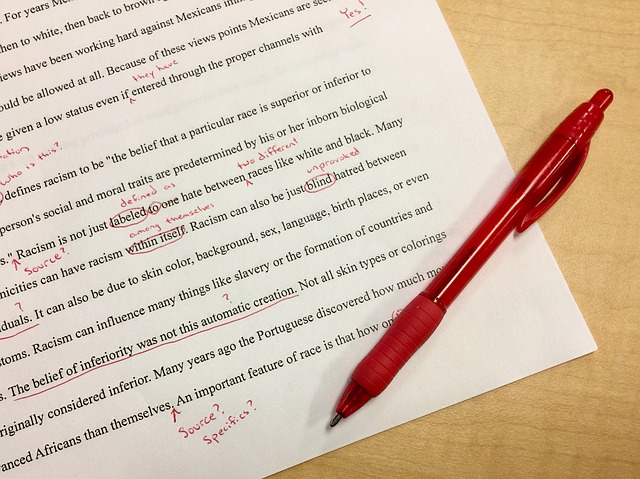
What’s Next?
Worried about how your GMAT score matches up to other applicants’? Find out more in our list of average GMAT scores by school.
Concerned about your chances of getting into an MBA program? Our guide to business school acceptance rates will help.
Ready to apply to business school? Check out our top eight tips for applying to MBA programs here.
Was this helpful? Sign up for FREE GMAT and MBA guides!
Share this:.
- Click to share on Twitter (Opens in new window)
- Click to share on Facebook (Opens in new window)
- Click to share on Google+ (Opens in new window)
Author: Laura Dorwart
Laura Dorwart is a Ph.D. student at UC San Diego. She has taught and tutored hundreds of students in standardized testing, literature, and writing. View all posts by Laura Dorwart

Write a why MBA essay that makes the admissions angels sing
- April 26, 2021
Successful MBA essays showcase brilliant future goals, detailed future positions that inspire, and intimate and tangible school fit. Here’s how to achieve that in your own why MBA essay and MBA admissions process.
What is MBA school fit?
Fit is a really important thing. Have you ever worn shoes that were just a half-size too small? Or a suitcoat that wasn’t quite right and pulled in the shoulders?
Oh yes. Now imagine being in an MBA program that just doesn’t quite fit —the culture doesn’t align with your values, or the career placement, approach towards teaching and pedagogy, or the student clubs are a swing and a miss for the experience you want to have. That would suck.
School fit is mutual: you’ve got to fit the school, and it’s got to fit you! Showing school fit is your key to an amazing MBA personal statement and career goal essay.
When you’re creating your business school application, you need to
- choose programs that will support you with your personal and professional goals, and
- show these schools that you’d be a stellar addition to the program and your future classmates.
Let’s talk about what “school fit” really means.
Prefer video? Watch this:

The word “fit” causes a lot of heartburn for MBA applicants because when schools say, “showing fit with our program is important,” candidates often mistake it to mean “showing you’re good enough .”
And remember, we’re not playing the good enough game here. You ARE good enough to get into business school .
But even if you put “good enough” aside, the concept of fit seems vague and unactionable.
So let me demystify it for you.
The admissions committee has a very short and precise list of questions about you that they’re contemplating as they evaluate whether their program is a fit for you.
1. Are you going to business school for the right reasons?
2. have you done your research, 3. will you leave the place better than you found it, 4. is this school your top choice.
That’s it. Plain and simple. Notice that these four questions are all about YOU.
Notice also how practical and commonsensical they are. They’re questions you need to ask YOURSELF first before you can even decide to apply to a school in the first place.
In other words, here’s the question to keep in mind:
“How do I SHOW school X that THEY’RE a fit for ME in my business school admission essay?”
Whereas storytelling is an art form, exhibiting MBA program fit is more like a science.
Let me iterate just once more: “fit” is really not the same thing as “qualified to attend our program.” That is a separate calculation.
Table of Contents
Calculating your mba odds and determining your school fit are two totally different things.
The first place most people’s minds go when they think about school fit is GMAT, GMAT GMAT. But the GMAT and GRE don’t play a role in school fit.
Each school WILL evaluate your GMAT or GRE score, your GPA, your resume (i.e. your accomplishments and career progression) and those will determine whether you’re qualified to attend the school.
To understand how competitive you are from the standpoint of these stats, be sure to look at school acceptance rates and the average class stats vis-à-vis the class profile links above and the rankings:
- Economist MBA Rankings
- Forbes MBA Rankings
- US News MBA Rankings
- Poets & Quants MBA Rankings
- Bloomberg MBA Rankings
(Sidebar — does it also strike you as odd that there are more than 6 different MBA school rankings? Do we really need that many? Try to keep in mind that the purpose of rankings is to sell subscriptions to the publisher’s service, not to actually help you get into b-school. So take them with a huge mound of salt.)
Or even better than consulting the MBA rankings, go get your personalized MBAmo MBA Calculator report . Just enter your GMAT, grades, and a little other data. And in 60 seconds you’ll get a 20-page readout on your MBA candidacy and fit with your favorite schools.”
MBA admissions calculator, MBAmo.
Get your customized school odds and strategy report & kick off your MBA application sprint!
Calculate your odds
Your stats do matter, but fit is an entirely different calculation. A candidate who is barely qualified can still get in if their fit with the school is strong. I could share dozens of case studies from my own client roster to prove this. People who were 10 years older than average. People with weak GMATs or GPAs. People with no community service or short careers to date.
It’s not the best MBA candidates that gain business school admission, it’s the best fit candidates
By some calculations, 70% of applicants qualify .
Fit, therefore, will play a huge role in determining whether you’re actually admitted from the huge pool of qualified hopeful students.
Just like bathing suits (or those shoes and suitcoats I mentioned earlier), MBA program fit is mutual. You fit the program and it fits you.
You’d never buy a bathing suit that doesn’t fit you, so why buy a $200,000 MBA that doesn’t?
Not everyone belongs at every school.
Although any MBA education is going to propel your career forward, school cultures, your fellow students, and the campus experience vary so widely that you’re unlikely to be truly happy at more than a few programs. Figuring out which ones are really for you is a part of the process.
Every year exceptionally qualified candidates get rejected because they don’t show MBA program fit. The most important thing you can do for your MBA applications is demonstrate fit .
So let’s dig in and talk about the first component of MBA program fit.
Step 1: Show the admissions committees you’re going to business school for the right reasons
There is really only one reason people go to business school: because they want more..
In fact, this is the only reason people do anything. Because they want more… more money, more stuff, more knowledge, more freedom, more happiness, more love, more sex, more joy, more power, more whatever. We all want certain things in life. That’s part of what defines us.
If you’re considering business school, it’s because you want more from your career. You want to do more of the stuff you love and less of the stuff you find boring. You want to have more impact at a higher level. You want more leadership experience. You want more authority, expertise, and regard. You want your career to matter more — to you and to the world. (We’re not your everyday MBA Admission Coches, but this is why we focus on MBAs at Career Protocol. Because we LOVE people who want that stuff.)
If this is the only reason people go to business school, then how could you fail to show that you’re getting an MBA for the right reasons?
People make two big mistakes in this regard.
MBA Application Mistake #1: People don’t do the work to figure out who they really are and what they really want.
Stanford gives you a great opportunity to do this in their application essay. “What matters most to you and why?” they ask.
Inherent in that question is an invitation to reveal who you truly are and what you truly value – your personal traits and personal experience, what makes you you. Remember, everyone wants more — in that way we’re all the same. Further, all MBA applicants want to make a bigger difference, achieve more impact, and help more people (including themselves and their loved ones) have better lives.
We’re all the same in that way, too. So keep this in mind:
What makes you unique isn’t what you want or even what you value, it’s the choices you’ve made in service of those values.
When it comes to any given pool of MBA applicants, one facet of diversity that stands out among the thousands of essays the admission committees read is the choices made. Some people took jobs in banking, others took jobs in nonprofits. Some people chose to mentor their peers, others chose to invest time in developing themselves further. Some stayed close to friends and family, some charted new courses in new geographies.
Who you are today is the reflection of all the choices, big and small, that you’ve made in your life, and the best way to launch your MBA application process is to explore, own, and celebrate those choices . In doing so, you’ll not only uncover your best stories for your MBA essays (more on how to craft winning MBA essays and write your Life Story ), you may also discover in a new and inspiring way the course you want the rest of your life to take. And please don’t write like these terrible MBA sample essays .
How to AVOID mistake #1: Construct clear and well-motivated career goals when you talk about why you want to go to b-school.
There is no substitute for deep self-awareness as the foundation of your MBA application process. This is why our application services begin with the You Discovery Process™. Taking the time to explore and honor your life choices will get you a long way in this direction. If you want to home in even further on your motivations…
Ask yourself some hard, deep questions, and answer them as honestly as you possibly can.
Here are some useful avenues of exploration to help you build a compelling essay:
- What are the core values you strive to uphold in your daily life?
- List 2-3 times in your life when it was very hard to live up them, but you did it anyway. What did you learn?
- List 2-3 times you failed to live up to those values. How did you change after those experiences?
- If you could be known for only one thing in your career so far (a value, a choice, an accomplishment, whatever), what would it be?
- What one thing must you tell the admissions committee about who you are as a person to feel like you have helped them make a fair and good decision about you?
Here are some more tips to build a strong future career goals, a solid long-term objective, and strong reasons why you need an MBA for your essays based on those insights from our Career Guru, Aziz

If you want to chat through these questions — or any other part of your MBA applications with a seasoned savvy MBA Admissions consultant Professional Development Coach — apply for a free MBA strategy session.
Now let’s look at one more way applicants go wrong in answer the why they want an MBA essay question?
The misconception about goals is that you have to have a certain goal or a certain subset of goals in order to be an attractive candidate for a given school. And this is just patently untrue. There is literally an infinite array of MBA application career goals that you could have that both necessitate an MBA and that make you an attractive candidate for business school. And which goals or set of goals is right for you depends on you. It depends on your background, your experiences, your ambitions and your vision for the future. It depends on where you want to have an impact. It depends on the kind of work that you want to be doing post MBA based on the experience that you've had pre-MBA. You’ll submit a unique MBA application that is tailored to you and your personal experiences. I can't tell you how many times I've had my clients go and speak to their friends who are alumni, their alumni friends tell them “You need to destroy this entire essay and you need to talk about wanting to have goals in finance.” or “You can't say that you want to go into consulting, everybody says they want to go into consulting.” or “You have to have an entrepreneurial goal or the school isn't going to accept you.”. The problem with taking advice in general from alumni is that they have a data set of one. They have their own application process and what they believe made them successful in getting into business school. It's only natural to think that whatever worked for you is definitely what's going to work for everyone else. But this is crazy and it's wrong because for the most part, there's a very good chance that those alumni got into school, not because of their essays or their goals, but in spite of them.
This was definitely the case in my case. When I look back on all the horrible mistakes I made in my MBA essays, I can't even believe how lucky I was to be admitted because frankly, I was admitted not because of my essays, but in spite of them. So, taking advice from anyone who has a single data point is always a risky proposition. And where I see this most going wrong – with alumni in particular – is advising you to have a certain set of MBA application goals that they think the school is interested in or that they themselves met success with. But that has nothing to do with you or your specific ambitions or your unique MBA application. And I'm picking on alumni here, but if you go to the internet, you're going to find a lot of misinformation about what goals you should and should not have when you apply to business school.
Mistake #2: People have the wrong expectations for what an MBA program can provide.
Yes, any MBA will help you get more from your career by helping you develop better professional knowledge, some technical knowledge and a whole slew of soft skills: communication skills, interpersonal skills, leadership skills, managerial skills, team management skills, and an international perspective. Read more about why you should get an MBA in this article.
But no MBA is a magic wand . It is not a substitute for hard work, self-awareness, questioning, networking, relationship building, appetite for learning, willingness to fail, or an understanding of how the world really works .
Here’s an example of what I mean:
Venture Capital is a tiny, competitive niche industry relative to many other business positions. Very few people get the chance to work in Venture Capital and those who do check many boxes. They have a demonstrated track record of entrepreneurial thinking and acting, they have elite relationship building and management skills, they have a highly advanced financial analysis skillset, and they ALREADY have at least the start of a strong network in the field. They frequently have already held technical roles or a position as a management consultant, investment banker, private equity analyst, or serial entrepreneur.
If someone like me — an English teacher with a little Human Resources exposure and a professional network based entirely in South Korea at the time I applied to bschool — claimed I wanted an MBA so I could get my first post-MBA job in Venture Capital in Silicon Valley, that would be magic wand thinking.
The MBA cannot grant any possible career wish.
That doesn’t mean you can’t have absolutely anything you want in your career. It just means that no degree is going to magically make it happen for you. And schools know this.
If the school admitted me believing it could magically make me a Venture Capitalist, I would have ended up a very unsatisfied customer indeed. Nobody wants that, and that’s why your application MUST reflect an accurate understanding of what the MBA offers vis-à-vis what you need to fulfill your goals .
How to avoid mistake #2: Have credible goals that are achievable with your specific background and knowledge (and a little bit of an MBA goose).
Create a tactical plan to get to where you want to go. What this really boils down to is
- Share an inspiring Long-Term Vision, and
- Have a credible Medium-Term Strategy to get what you want (i.e. a plan for your internship and immediate post-MBA job). Understand what it actually takes to get one of those jobs, and make sure your post-MBA goal makes sense given your business experience and current position.
Do you want to work at an e-learning company after school? E-learning companies do not tend to recruit en masse on MBA campuses. So how will you build your own network in that industry, leveraging your and school resources to create such opportunities? And then, of course, what skills, learnings, and experiences do you need from the school to prepare yourself for your target roles?
Check out our Comprehensive MBA Career Report for much more insight into which companies recruit at which MBA programs.
Pro Tip: If what you REALLY want isn’t achievable immediately post MBA, make it your second step or longer-term goal.
(Entrepreneurship falls into this category for 95% or more of applicants.)
Finally, and crucially, you have to understand what your dream schools actually facilitate in terms of recruitment . Where do alumni of your favorite MBA universities actually go to work?
Want to work in Silicon Valley? Stanford and Haas can help you out a lot by providing direct interaction with companies just down the street. Columbia Business School and London Business School will struggle more since they’re geographically so much farther away. How will you compensate for that with your own efforts, knowledge, and multi-disciplinary creative approach to recruiting?
Step 2: Show schools you’ve really done your research
School research is so important that we’ve actually got multiple articles explaining how to approach it.
When you’re constructing your career goal essay, be sure to research all aspects of the school: the learning environment, key classes and professors, the alumni network, the experiences of classmates and current students. Business schools aren’t just teaching business. They’re creating a two-year 360 degree experience in the type of environment that fosters learning both in an out of the classroom. Be sure you get to know it well.
Here are some ways to do that:
- Figure out which MBA programs are best for your goals
- Show your target schools the love
- Visit campus when you can
- Research the learning experience
- Ask good questions of current students
And since things aren’t so normal lately, here’s how to network with schools during a pandemic.

Step 3: Show them you’ll leave the place better than you found it.
Showing you’re going to have a positive impact on your MBA community and classmates goes beyond what you write in your personal statement. Your MBA resume should show a track record of contributions to the communities you’ve been a part of. Your story essays should reflect the values of inclusivity and service, character, empathy and kindness.
But I talk a lot more about showing school’s you’re going to be a contributor to the campus community in this article about showing showing MBA Program Committees You’re Worth Investing In
Step 4: Show them they’re your first choice.
SHOW (don’t tell) schools they’re your Number 1 choice.
This last one is tricky, and it’s basically the sum of everything we’ve discussed so far. As I mentioned at the start, you’re asking a school to invest in you — they have, let’s say, 575 seats in their program, and you’re asking them to give you one.
Schools have legitimate concerns about yield due to the pressure of rankings.
In other words, the higher the percentage of admitted students who matriculate , the better it is for their ranking. Harvard Business school is king here, then Stanford Graduate School of Business. The rest trail by a wide margin. So programs want some assurance that their choice to invest in you (i.e. give you one of their coveted seats) is a good one.
The best way to show them that their investment in you is safe is to invest in them first.
Important sidebar here: Don’t lie . Please don’t write “Wharton / Harvard Business School / Columbia Business School / Chicago Booth is my first choice school because blablablabla.” It will seem disingenuous even if it’s true , because schools know that you are almost certainly applying to multiple schools. Talk is cheap anyway. Remember, MBA admission is not about pandering.
This is part of why Harvard Business School doesn’t have a formal personal statement essay question. They don’t put a strong emphasis on school fit until the interview because they know they’re your first choice, so they don’t even bother asking. They will, on the other hand, note if you have visited campus, visited their website (multiple times and for how long), and engaged with their media.
So if you want to seal the deal on showing a school that you’re worth investing in…
Take as many actions as you can (big and small) to get to know your target schools and their communities.
Information about your web activity is being recorded at all times. The technology to track your behavior on websites isn’t even that new, and you can bet at least some schools are tracking your activities on their site. So get over there!!
Visit your favorite schools’ sites on a regular basis, click around, read stuff. It’s part of research, but it’s also part of your investment in the program. You’re investing your time, after all, in getting to know them.
Go to local events in your area hosted by target schools and their alumni community.
Go to the Forte Forum , QS MBA World Tour , the Poets&Quants Centre Court Event , and/or the MBA tour in your area and rub elbows with adcom members. Ask good questions and make sure your attendance is registered (i.e. sign the sign-in sheet).
Once again: When it’s possible to do so, go to campus. Even if you do it in the summer when students are away, make sure your presence is registered .
Finally, if the school includes a “Creative Essay” option — you know, the videos, PowerPoints or other multimedia that takes a lot more work and commitment — do it if you can tell your best story through that medium. Engaging with this alternative option shows your commitment and investment. Use one of these 10 cool tools to create it .
If you do all these things, your Why MBA essay should knock their socks off, blow their minds, and make the angels sing.
Or at least, it will give the very best chance at MBA admission at your favorite schools.
If you’d like a partner for your MBA journey and a team of MBA Admissions Coaches who’ll help you find your authentic voice and shine in your MBA applications in the most inspiring way, that’s what we’re here for.
Let’s have a conversation!
Talk to us..

Angela Guido
Student of Human Nature| Founder and Chief Education Officer of Career Protocol
Recent Posts
- Is an MBA Worth It in 2024?
- MBA Salaries, Cost, “Bad” MBAs, Online MBAs, and Diversity in Business School
- Should You Go To Business School in 2024? Here’s Everything You Need to Know
- GMAT scores at Top Schools, How to Finish Your MBA Application Strong and What to Do Post-MBA Application
- MBA Adcom Spills the Tea on Your GMAT Score
- Facebook Messenger
- More Networks
Inspira Advantage

20 Essential Tips on How to Write A Killer MBA Essay
Types of mba essays.
There are a few different types of MBA essay questions you will answer as part of your MBA application. The type of essay can be determined through the keywords used in the essay question. Each type of essay will have its own length requirements, depending on the business school.
This type of essay asks you to detail your personal and professional goals and how attending business school will help you achieve them. An essay question that asks about your aspirations or what you hope to gain from an MBA program is classified as a goal essay.
For example, Wharton is one of many schools that ask for a goal essay from applicants using the question: “What do you hope to gain professionally from the Wharton MBA?” Columbia , NYU Stern , Darden , Dartmouth Tuck , and McCombs are some of the many other schools that ask about your goals.
Self-Reflection
A self-reflection essay is an opportunity for you to showcase the values and characteristics that make up your personal identity. It also requires you to discuss how you handled a failure at some point in your life or how you would approach an ethical dilemma.
Yale School of Management is one business school that uses self-reflection questions in its MBA essays . They want to know what the biggest commitment you have ever made is, including why you chose it and how you went about making it.
Answering this question will require you to do some deep reflection in order to answer it thoroughly.
Contribution
The objective of this type of essay is to show an admissions committee how you will add value and contribute to their MBA program.
Booth School of Business poses this question: “An MBA is as much about personal growth as it is about professional development. In addition to sharing your experience and goals in terms of career, we’d like to learn more about you outside of the office. Use this opportunity to tell us something about who you are.”
Booth clearly wants you to elaborate on who you are, what you value, and how you live those values in your everyday life.
Some business schools want to know about the impact you will have on their program and pose a question that asks you to describe a time when you demonstrated leadership. This will involve discussing why you took on the leadership role in your chosen situation and your leadership impact.
Darden School of Business poses essay questions designed to gauge your leadership capabilities and the impact you’ll have on the program. As Dean of Admissions Dawna Clarke states, they are interested in “cultivating high impact leaders.”
It’s no surprise that one of their essay questions from a recent application cycle was, “Darden strives to identify and cultivate responsible leaders who follow their purpose. Please provide an example of a situation in which you have made a meaningful impact.”
Instead of writing a traditional essay, some business schools ask you to submit a video essay. The types of questions asked for a video essay can range from a short introduction to longer, multi-component questions.
Kellogg is one business school that uses video essays . They will ask you three questions. First up is an introduction, and the second is about your career goals and how Kellogg will help get you there.
The third question varies annually and is generally more randomized, so you and all the other applicants won’t necessarily respond to the same question.
Top 20 Tips on How to Write a Great Business School Essay
Successfully writing business school essays is tricky. Many factors go into constructing a successful one. However, the top tips we’ve provided below outline how to write an MBA application essay that stands out from the crowd.
1. Brainstorm
Focus on each essay question individually. Start with the essay that feels easiest or most natural to you. Your writing will improve as you go. Choose topics that highlight your strengths, experiences, and achievements to make the strongest impact.
2. Make an Outline
Before you start writing, outline the main points you want to cover in a logical order. Consider how much space each section of your essay should take up.
3. Create a Draft
Once you have a good outline, start your first draft. It's okay if it's not perfect yet. First drafts are usually longer but focus on getting your main points down and ensuring they connect well.
4. Pay Attention to Your Essay Structure
Blair Mannix , Wharton's Admissions Director, says successful essays have three parts: the setup (who you are and what you've learned), the pivot point (what you want to learn and how it will help your career), and the future (how the MBA program will help you achieve your goals).
For essays on contributing to the MBA community, be personal, tell a story, and connect your experiences to the community.
5. Consider the Tone You Use While Writing Your Essay
Be genuine in your essay. Admissions committees can tell if you're insincere or just writing what you think they want to hear. Laurel Grodman from Yale School of Management says your essay should reflect your voice and highlight something meaningful in your life.
Write about what truly matters to you. Incorporate your personality, such as your creativity or humor, to help the committee get to know you better.
6. The Best MBA Essays Are School-Specific
When writing a business school essay, focus on why you want to attend that school. Show you've done your research by mentioning the curriculum, extracurricular activities, and research centers you're interested in. This makes your essay more compelling by explaining what you'll gain from the program and how it will help you succeed.
7. Pick an Event or Situation That Matters to You
When you select your topic to write about in your MBA essay, you need to make sure it is something that had a significant impact on your life and resonates with you personally. This will help ensure your authenticity shows through.
8. Explain Why You’re a Right Fit For the School
Just mentioning that you're the ideal candidate isn't enough. This won't persuade the admissions committee to accept you. Instead, you should provide specific examples and evidence showing why you're a great fit. Discuss your achievements, experiences, and skills that align with the program's goals.
9. Include Passion Into Your Writing
Admissions officers want to know what excites you and if you'll bring that same enthusiasm to the classroom. Share your passions and interests, and explain how they drive you. Show how your excitement for learning and goals will make you an active and engaged student.
10. Highlight Your Diversity
Business schools value having students from diverse backgrounds. When writing your application, share experiences demonstrating how your unique perspective can enrich the school's community. Explain how your background, interests, or experiences can contribute to a vibrant and inclusive learning environment.
11. Address Inconsistencies
If you have gaps in employment or a low GPA, be upfront about them. Explain how you've grown or learned from these experiences, emphasizing your positive steps to overcome challenges. This demonstrates resilience and maturity to the admissions committee, showing them you can handle obstacles effectively.
The Importance of Storytelling in MBA Essays
Business school admissions officers want to see how you approach traits like leadership and commitment in your MBA application essay. Yet, if you describe an experience and don’t reflect upon it, you will not highlight your mindset, dedication, and motivation.
The best writers outline the traits that business schools want to see by telling personal stories and anecdotes. But how can you do that? It’s simple — show how your experiences impacted you. Don’t just tell us about it.
Indeed, to use the idea of commitment as an example, Yale’s admissions committee “cares less about the commitment you choose and more about the behaviors surrounding the commitment.” They want to “come away learning something new about you as a person that helps us understand your values and motivations.”
Illustrating how your experiences affect your values and motivations is difficult; this process requires a lot of introspection and self-reflection. The trick is to use plenty of real-life examples and explain how they embody your values.
One way to successfully do this is to use the STAR technique . The STAR technique is split into four distinct steps:
- Situation - Describe the situation and when it took place.
- Task - Explain the task and what was the goal.
- Action - Provide details about the action you took to attain this.
- Result - Conclude with the result of your action.
Using the four steps outlined above, you can create concise, compelling answers to your essay prompts. Let’s use one of the Berkeley Haas essay prompts as an example for an MBA essay outline:
What makes you feel alive when you are doing it, and why? (300 words maximum) .
We can split this prompt into two sections:
- Describe an activity, hobby, or anything that makes you “feel alive” when you do it.
- Explain why you find so much enjoyment in this one thing.
Storytelling is key here, and the STAR technique can help you break down exactly what you want to say. Remember, it is important to reflect upon your experiences and, in this case, show why you enjoy something.
If you manage to do this in your essays and show how you achieved results along the way, you will submit a strong MBA application essay.
Plagiarizing Your MBA Essay
Plagiarism is a big deal.
Even if a student doesn’t intend to plagiarize someone’s work, colleges can and will detect it. If colleges detect plagiarism, they will likely reject the application outright; UCLA’s Anderson School of Management rejected 52 MBA hopefuls for application plagiarism.
Applicants can easily and accidentally plagiarize someone else’s work by following MBA essay examples too closely. Essay examples are useful, as they can inspire you and give you an idea of how you can reflect upon your experiences. However, someone has written that example about their own experience in their own words, and you can’t copy it.
If you are worried about plagiarism, the simple fix is to be original. After all, admissions committees want to hear about your experiences, motivations, and opinions.
Authenticity is also an extremely important part of writing well; you will come across as more genuine writing about your genuine thoughts and experiences. If you want to check your work, you can use reliable and low-cost plagiarism checker tools like PrePostSEO and Copyscape .
MBA Essay Examples
US News wrote an article on what makes for a successful MBA essay. They provided the following MBA entrance essay sample essays written by applicants recently admitted into highly reputable business schools.
This sample was written for Fox School of Business at Temple University .

This essay was well-received by the admissions committee because it was written clearly and concisely, free of grammatical errors, and told a story. The candidate showed their personality and explained why a Fox MBA would help them achieve their career goals.
This particular candidate was honest in their essay about their weaknesses and professional growth, which is generally well-received by admissions committees. The candidate detailed the initiative they had taken in learning about the MBA program at Fox and why they decided to apply.
This next successful essay sample was written for the Yale School of Management.

Similar to the previous example, this essay told a compelling story through a clear narrative. This particular essay began with an anecdote that demonstrated the candidate’s work ethic, initiative, leadership, and resourcefulness.
This show-don’t-tell essay displayed what was important to the applicant and offered the admission committee insight into their personality and values. It also provided as much detail as was possible, given the 500-word limit.
Don’t Rely Too Much on MBA Essay Examples
While MBA essay examples are valuable tools to see what got applicants into business school, they all have one problem: They are not yours. Other peoples’ essay examples don’t focus on your achievements, values, motivations, or experiences.
In their essays, originality and authenticity are two critical themes that business schools look for because your life is unique. Remember, MBA essay writing is all about getting to know you , and your essays should truly reflect who you are as a person.
MBA essay examples are useful. They can provide you inspiration, an idea of what can work, and outline how to discuss your own experiences. However, you need to draw a line in the sand and write your own essay at some point.
People are admitted to particular schools for a wide variety of reasons. While their essays are one of those reasons, what works for one person might not work for you. Try not to overthink it — write about your experiences, background, and, most importantly, opinion.
Mistakes to Avoid While Writing Your MBA Essay
In addition to following the steps for writing a great MBA essay outlined above, there are also some common mistakes you’ll want to avoid while writing your essay. These mistakes are listed below, along with solutions to fix them.
1. Submitting an Overly Complex Essay
Admissions committees want to know you as a person, not just your industry jargon. Avoid complicated essays that frustrate readers. Instead, use your own words and write as if you're talking professionally to a coworker. This makes your essay clearer and more personal, helping you connect better with the reader.
2. Not Reading the Essay Question Closely or Misunderstanding the Question
To answer MBA essay questions correctly, understand the question fully. Misreading it can result in an off-target essay and a rejected application.
To fix this, find the keywords in the question to understand what the admissions committee wants to know. Words like "contribute," "gain," and "lead" indicate what to focus on. If confused, seek clarification.
3. Restating Your Resume or Letters of Recommendation
Admissions committees want your MBA essay to tell a unique story, not repeat your resume or recommendations. Choose a topic that isn’t covered elsewhere in your business school resume and letters of recommendation . If needed, focus on a specific project, detailing the challenges, solutions, outcomes, and lessons learned.
4. Starting Your MBA Essay Close to the Deadline
Starting close to the deadline means you'll rush and make mistakes. To avoid this, start planning your essay as soon as the questions are available. Create an outline for each essay and start early to give yourself enough time to write and revise without stress.
5. Giving Half-Baked Reasons for Attending Business School
Business school admissions committees use your essays to gauge your interest in their program. If you're vague about your career plans and reasons for choosing their school , take time to outline them clearly. Show clear, well-defined goals and explain why you want to attend their program.
6. Going Over the Word Limit
Going over the word limit shows you can't follow directions, work within limits, or organize your thoughts. These skills are crucial for understanding requirements, staying focused, solving problems creatively, and communicating clearly.
7. Not Reviewing Your Essay For Grammar Mistakes
A sloppy application suggests a careless attitude, raising concerns about your attention to detail and seriousness. A well-organized application shows diligence and respect for the admissions committee's time.
8. Being too General
An essay full of generalizations suggests you lack specific insights or personal depth. Admissions committees value unique perspectives and concrete examples that show your thoughtful engagement with the topic.
9. Talking About High School
Admissions committees prioritize recent, relevant professional achievements over high school roles like newspapaer editor or varsity team captain. Focus on highlighting recent experiences that showcase your readiness for their program.
1. How Long Should My MBA Application Essay Be?
The length of your MBA essay will depend on the specific school; some schools allow up to 500 words, while others want a very short and to-the-point response of 150 words.
The length set out by the MBA program you’re applying to is an important consideration, and it is not a good idea to go over the word limit. Admissions committees want to see that you can follow instructions and are capable of writing succinctly. It will not reflect well on you to go over the allowed word count.
2. Is the MBA Essay Less Important Than My GPA and GMAT Score?
No, your MBA essay is at least equally as important as your GPA and GMAT score . While your GPA and GMAT scores are good indicators of your academic abilities, the MBA essay is the admission committee’s first opportunity to get to know you personally.
This is also the first impression you will make on the committee, so it’s imperative that you write a strong and compelling essay. Most business schools use a holistic approach to assessing applications, and your response to the essay question can determine whether you are a good fit for their program.
3. Is There an MBA Essay Guide for Reapplicants?
Many schools will require or suggest that reapplicants submit an additional essay.
This will vary by school, and it is important to check with each school’s website for the exact details of what’s expected of reapplicants. If it’s optional, it is a good idea to submit one because it allows you to explain how you’ve grown personally and professionally since your previous application.
4. Can I Use the Same Business School Essay if I’m Reapplying?
It’s unlikely you’ll be successful using the same essay since your response could have been the reason you were rejected the first time around.
It’s best to consult with an MBA admissions expert or mentor to find out where you went wrong and what you can do to make your reapplication essay strong and stand out in the best way possible.
5. How Do I Edit My MBA Essay Draft to Make It Better?
First of all, make sure there are no errors with your spelling, grammar, and syntax. Business schools want students with superb communication skills, and having basic errors in your MBA essay does not demonstrate that you have strong communication skills.
Then, you should go through the common mistakes outlined above and make sure those are not present in your essay; if they are, fix them. Seeking a second opinion from a friend, mentor, colleague, or MBA essay editing expert will also help locate errors or improvement areas.
6. How Can I Ensure My Business School Essay Stands Out?
Whether you are faced with the Wharton MBA essays , Harvard Business School essay , or Booth MBA essays , to name a few, there are a few things you can do to make your essay stand out.
The event or experience you choose to write about should be something you are able to write about in a compelling narrative. It should also be something you can write about with passion, which will allow the admission committee to see your genuine and authentic voice.
Your strengths should be woven in with the story you’re telling. These things will make your essay stand out to the admission committee and help them remember you.
Unlock Your Future with the Perfect Business School Essay
Knowing how to write a great MBA essay can be a challenging component of the business school application process.
But, if you know where to start, make an outline for each essay, and get expert assistance, the process becomes significantly more manageable. Following these steps will help you write a killer MBA essay.
About Inspira Futures
Schedule a free consultation, you may also like.

Top 15 JD MBA Programs and How To Get Into Them

NYU Stern Part-Time MBA Program - The Complete Guide

How to Approach the Top MBA Essays

While there are an increasing number of compelling MBA programs around the world, with impressive rankings and strong alumni networks, the M7 schools continue to be attractive choices for MBA hopefuls.
For those planning to apply to one or more of the M7 schools this winter, Personal MBA Coach is here to help you navigate the essay-writing process.
Accessible to all Personal MBA Coach newsletter subscribers, our free M7 Essay Analysis e-book features our exclusive guidance on how to approach the 2023-2024 application essays for each of the M7 business schools.
Below, Personal MBA Coach shares the required essay questions for all of the M7 schools, as well as some quick tips for how to respond successfully to these top MBA program essays!
Stanford GSB Essays
Number of Required Essays: 2
Essay 1: What matters most to you, and why? (650 words suggested)
Personal MBA Coach’s Quick Tips: Take considerable time to reflect upon what you are most passionate about. In an ideal scenario, you have acted on this passion, and it is reflected in more than one aspect of your life. Think carefully about why this passion is important to you, and do not forget the WHAT here. At the end of the day, a cause or passion that you have done nothing with will not resonate strongly with the admissions committee (or be very believable).
Essay 2: Why Stanford? (400 words suggested)
Personal MBA Coach’s Quick Tips: For this second Stanford GSB essay, start by setting up why you want an MBA, including your goals and the skills needed to make these goals a reality. Then, make it clear how Stanford specifically will help you fill these skill gaps, mentioning classes, clubs, and programs that interest you. Do not forget to detail what draws you to Stanford’s culture as well!
For more Stanford GSB essay advice, check out Personal MBA Coach’s full blog here .
Wharton Essays
Personal MBA Coach suggests that you consider each Wharton essay individually while also making sure that your two responses complement one another.
Essay 1: How do you plan to use the Wharton MBA program to help you achieve your future professional goals? You might consider your past experience, short- and long-term goals, and resources available at Wharton. (500 words)
Personal MBA Coach’s Quick Tips: The first Wharton essay gives applicants the opportunity to reflect on their high-level aspirations. As you consider your future, think about your skill gaps and how attending Wharton will enable you to close these gaps. Cover the opportunities you want to avail yourself of on campus and be sure to demonstrate a clear understanding of Wharton’s culture.
Essay 2: Taking into consideration your background – personal, professional, and/or academic – how do you plan to make specific, meaningful contributions to the Wharton community? (400 words)
Personal MBA Coach’s Quick Tips: This second MBA essay question gives candidates a chance to showcase previous accomplishments and potential contributions to the Wharton community. Applicants can choose from impressive extracurricular accomplishments, specific talents, and/or distinct professional skills. A powerful response will highlight multiple contributions that clearly unite your personal story , career goals, and passions!
Get Personal MBA Coach’s detailed guidance on Wharton essays 1 and 2 here .
Harvard Business School Essay
Number of Required Essays: 1
Essay: As we review your application, what more would you like us to know as we consider your candidacy for the Harvard Business School MBA Program? (900 words maximum)
Personal MBA Coach’s Quick Tips: The HBS essay is an invitation to reveal what is truly interesting about you and let the admissions committee “meet” the person behind your MBA application.
That said, responses will vary significantly for everyone. Do not try to write what you think the admissions committee wants to read. Instead, consider the unique value that you will add to the HBS community.
Strong essays often share a detailed personal story, or at least some kind of personal anecdote, which is usually tied to a recurring theme within your HBS essay. However, be wary of trying too hard – you do not need to describe a super traumatic personal experience to impress the admissions directors.
Looking for more HBS essay advice? Visit our full blog here .
MIT Sloan Cover Letter
Rather than asking applicants to submit a standard MBA essay, MIT Sloan requests that candidates submit a cover letter.
Cover Letter: MIT Sloan seeks students whose personal characteristics demonstrate that they will make the most of the incredible opportunities at MIT, both academic and non-academic. We are on a quest to find those whose presence will enhance the experience of other students. We seek thoughtful leaders with exceptional intellectual abilities and the drive and determination to put their stamp on the world. We welcome people who are independent, authentic, and fearlessly creative — true doers. We want people who can redefine solutions to conventional problems, and strive to preempt unconventional dilemmas with cutting-edge ideas. We demand integrity and respect passion.
Taking the above into consideration, please submit a cover letter seeking a place in the MIT Sloan MBA program. Your letter should conform to a standard business correspondence, include one or more professional examples that illustrate why you meet the desired criteria above, and be addressed to the Admissions Committee (300 words or fewer, excluding address and salutation).
Personal MBA Coach’s Quick Tips: Here, applicants must think about their most noteworthy accomplishments, making it clear what they will bring to the Sloan community. Approach the MIT Sloan cover letter as you would approach any other professional cover letter. This means that you must tell the reader who you are and specifically ask for a place in the MIT Sloan class.
Get more of Personal MBA Coach’s MIT Sloan cover letter advice here .
Chicago Booth Essays
Essay 1: How will the Booth MBA help you achieve your immediate and long-term post-MBA career goals? (250 words minimum)
Personal MBA Coach’s Quick Tips: This first Chicago Booth essay is a standard goals question (for more tips on how to approach this as well as other types of application essays , check out our How to Write Winning MBA Essays blog ). Think about your short- and long-term goals, highlighting how you developed these goals and identifying your higher-level aspirations. Do not forget to think about your skill gaps and how a Booth MBA will help you achieve your post-MBA goals. You will want to detail the classes, programs, or clubs that you hope to take advantage of.
Essay 2: An MBA is as much about personal growth as it is about professional development. In addition to sharing your experience and goals in terms of career, we’d like to learn more about you outside of the office. Use this opportunity to tell us something about who you are… (250 words minimum)
Personal MBA Coach’s Quick Tips: This MBA essay prompt encourages candidates to reflect upon the personal aspects of their profile. Use this as your opportunity to show what differentiates you from other applicants. Possible topics to cover include values, passions, extracurricular activities, and hobbies.
Learn more about tackling the Chicago Booth essays here .
Kellogg Essays
Essay 1: Kellogg Leaders are primed to tackle today’s pressing concerns everywhere, from the boardroom to their neighborhoods. Tell us about a time in your life where you’ve needed a combination of skills to solve a problem or overcome a challenge. Which skills did you use? What did you accomplish? (450 words)
Personal MBA Coach’s Quick Tips: While most share a professional story for this first question, leadership examples in your extracurriculars could also work here. A successful response for this Kellogg essay will showcase your strengths and specific skillsets.
Essay 2: At Kellogg, our values are based on research that concludes organizations comprised of leaders with varied backgrounds and perspectives outperform homogeneous ones. How do you believe your personal and professional experiences to date will help to enrich the Kellogg community? (450 words)
Personal MBA Coach’s Quick Tips: This second Kellogg MBA essay is new, replacing Kellogg’s longstanding “values” essay. When answering this prompt, ask yourself what makes you special— and tell the admissions committee how you will bring your unique traits to Kellogg.
For more information, visit Personal MBA Coach’s full Kellogg essay analysis blog here .
Columbia Business School Essays
Number of Required Essays: 3
Essay 1: Through your resume and recommendation, we have a clear sense of your professional path to date. What are your career goals over the next three to five years and what is your long-term dream job? (500 words)
Personal MBA Coach’s Quick Tips: This Columbia Business School essay prompt enables you to show how you envision your career unfolding. The school asks for a short- and long-term dream job so make sure you include both. Although candidates should have lofty goals here, these goals should also align with their short-term goals and story as a whole.
Essay 2: The Phillips Pathway for Inclusive Leadership (PPIL) is a co-curricular program designed to ensure that every CBS student develops the skills to become an ethical and inclusive leader. Through PPIL, students attend programming focused on five essential diversity, equity, and inclusion skills: Creating an Inclusive Environment, Mitigating Bias and Prejudice, Managing Intercultural Dialogue, Addressing Systemic Inequity, and Understanding Identity and Perspective Taking.
Tell us about a time when you were challenged around one of these five skills. Describe the situation, the actions you took, and the outcome. (250 words)
Personal MBA Coach’s Quick Tips: This question directly addresses a topic that is continually top of mind for admissions directors at most business schools: DEI. It is ok to think about DEI broadly here. As you write this essay, be direct and authentic and of course avoid being preachy or judgmental.
Essay 3: Why do you feel Columbia Business School is a good fit for you academically, culturally, and professionally? (250 words)
Personal MBA Coach’s Quick Tips: CBS’s third MBA essay gives applicants a chance to share what attracts them to CBS. This is the perfect opportunity to talk about the classes, clubs, and additional programs that interest you, such as speaker series and immersion seminars. Be sure to cover classes and programs that are specifically unique to Columbia Business School!
Columbia Business School applicants can access our additional CBS essay advice here .
Ready to get started? Check out our Comprehensive Packages to see how Personal MBA Coach can help you craft your MBA application essay to any of these schools!

You also may like these other blog articles:

Find out why we are consistently ranked #1. Sign up for a 30-minute consultation today!
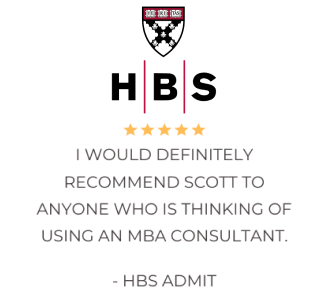
We have over 200 5 Star Reviews. Find out WHY!
schedule consultation
MBA Essay Prompts and Essay Examples
With sample essays from harvard, kellogg, stanford, and more.
Featured Expert: Nirusan Rajakulendran, MBA
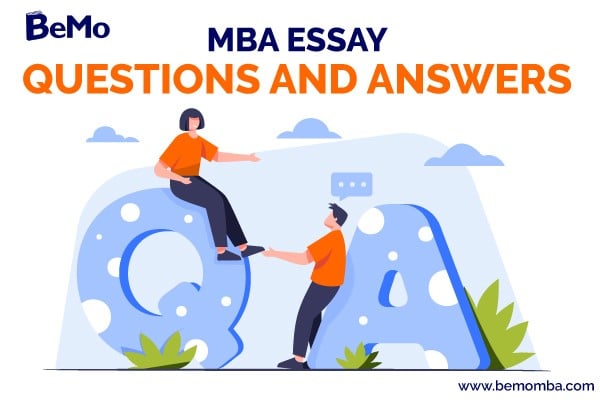
MBA essay questions and answers are helpful in tackling the MBA application essay. Knowing the MBA essay questions or prompts ahead of time lets you know what top MBA programs are looking for and reading some sample essay answers is a great way to begin brainstorming your own answers. The MBA essay is a critical part of your application, so many students consider hiring a grad school essay tutor to coach them on the writing aspect. Others can rely on MBA admission consulting to provide feedback on their essay draft. MBA essay questions typically stay the same year to year, but you might be thrown a curveball once in a while. In this blog, we’ll look at what you can expect from MBA essay questions and answers, as well as some prompts from top MBA programs and sample answers for each.
>> Want us to help you get accepted? Schedule a free initial consultation here <<
Article Contents 10 min read
Mba essay questions and answers.
Many of the top business schools use MBA short essay questions and prompts as part of their applications. The MBA essay is different than the MBA statement of purpose or MBA personal statement, which both focus on your personal motivations and future career goals. Most MBA programs provide specific prompts for the MBA essay, with questions curated by the admissions committee.
While the MBA essay questions and prompts may change from year to year, most schools stick with what works and ask all applicants the same probing questions about their personal motivations. A common essay question is “ why do you want to pursue an MBA ”. These type of questions are designed to gain a deeper insight into the applicant’s personal, professional and academic life. Admissions committees ask these important questions to see if you can both write a concise, insightful and poignant essay, and also to determine whether you are a good fit for the MBA program. For many programs, the essay is vitally important to the overall application, and can determine whether you’ll need to start your MBA interview prep or not. In fact, many of the most common MBA essay questions are similar to MBA interview questions , and ask applicants why they chose to pursue an MBA, why they chose particular school or how their strengths will contribute to the school’s MBA program.
However, a number of the top MBA programs ask the same questions each year, and the admissions committee are looking for certain traits and strengths in their applicants. Below we’ll look at some of the MBA essay questions asked by top MBA programs, as well sample answers.
The Stanford Business School requires all its applicants to submit two MBA essays. Both essays have a maximum word count of 500, so they are asking for short essay format. For Essay A, Stanford MBA asks applicants to answer: “What matters most to you, and why?”. For Essay B, the question is a simple: “Why Stanford?”. These both seem like simple questions, but they can be tricky to answer in practice. Read the sample below for an answer to the first Stanford MBA essay question.
Prompt: What matters most to you, and why? For this essay, we would like you to reflect deeply and write from the heart. Once you’ve identified what matters most to you, help us understand why. You might consider, for example, what makes this so important to you? What people, insights, or experiences have shaped your perspectives?
I have found both in business and in life, that having direction, having a purpose and goals, are vital. And the root of direction, in my experience, is organization. Organization might seem a strange thing to prize so highly, but to me it is essential to be organized lest we become disorganized. In disorganization, nothing can be planned, no goals can be accomplished. It breeds only aimlessness and purposelessness.
My dislike of disorganization can be traced back to my grandfather. For over 25 years, he owned a hardware store and handyman shop which he operated alongside my grandmother. Grandma’s office in the hardware store was tidy as a church. She did the books, hired and fired the staff, dealt with customers, sales and payroll. She was the skeleton, the structure holding the business together for decades. My grandfather’s shop could be featured on an episode of Hoarders. Shelves of boxes in disarray, tools laid haphazardly on benches or tables, sawdust and wood shavings littering the floor. Yet in this madman’s chaos he was never lost. He always found what he needed. His skill and passion for carpentry, for craftsmanship was undeniable. His creations were sold out of the store, and his expertise was highly valued by customers. It was a business marriage that somehow worked.
When my grandmother passed of a sudden heart attack, everything changed. The existing staff did their best to fill my grandmother’s shoes, but business started a slow decline anyways. My grandfather let disorganization creep into his time management. He ran behind on projects without my grandmother’s prompting and refused to enter her office. When I took it upon myself, I discovered an organized, if dusty, office. I managed to slide into my grandmother’s old job, but not her old role. My grandfather resisted attempts to organize his shop, saying it was organized the way he liked it. After some fruitless fights, I decided to try a new approach. I asked him to take me through his organization system and explain it to me. The way I saw it, the business he had built and nurtured his entire life wouldn’t survive if we couldn’t learn to balance his creative genius with organized structure. I wanted to understand his way of thinking so I could preserve the side of the business that was my grandfather. My grandmother, in her hyper-organized glory, had left behind everything we needed to continue. If my grandfather were to pass, there was no one who could replace him and keep his business and legacy behind. There was no sense of direction. Of organization.
My grandfather spent an entire day explaining his system to me. I followed behind him, taking notes and making labels. I recorded his organizational system, nonsensical though it was to all but him, so I could preserve the spirit of his goals and direction for the business. But without knowing how it was all organized, I would not be able to carry on his role. (word count 496)
Want to see more Stanford MBA personal statement examples ?
Prepping for your MBA interview? Check out this infographic.
For those who want to know how to get into Harvard Business School , there is only one required essay for the MBA application. This year, the school has imposed a maximum word limit of 900, though it is acceptable to stay within the 500-to-700-word range. The Harvard Business School essay is considered vitally important to the admissions committee, so it can be a significant factor in your overall application. Hiring an MBA essay consultant might be a good idea to tackle the Harvard essay, so you can be sure to submit a polished and succinct document. Or read some Harvard MBA personal statement samples to get an idea of what to write about.
Prompt: As we review your application, what more would you like us to know as we consider your candidacy for the Harvard Business School MBA Program?
I’ve often been accused of being unable to commit to anything. Of being too flaky. Of changing my mind or jumping from opportunity to opportunity, hobby to hobby. This has always been said with an air of censure and disappointment. It’s always set off my internal defense mechanism because I never understood why having many interests or pursuing them could be bad. When I decided to apply to this MBA program, there were plenty of naysayers. Those who thought I wouldn’t be able to commit to this program. Yet I arrived at the decision to pursue an MBA after learning a vital lesson about myself, and it is this lesson I would like to share with you.
My apparent flakiness comes from my childhood upbringing. As all children of military parents, I was often moved around, bounced from school to school. We never learn to put down roots, and we get used to changing environments and having to start over from scratch over and over again. This creates a pattern, but it also builds resilience and flexibility. It plants the seeds of determination to see things through when they really matter. As I grew up and applied for university, I received some surprising feedback from family members when I was rejected from the programs I applied to. Their response was to shrug their shoulders and tell me I wouldn’t have been able to commit to a four-year degree anyways. So it was for the best. At first, I believed them, but eventually my decision not to try again weighed on me. I reapplied for school, and this time I was successful.
Throughout school and even after I graduated, I bounced from job to job, never really satisfied. Once again, it reinforced the view others held of me and the view I held of myself. I couldn’t commit. I had no structure. But I came to realize that it wasn’t me. I wasn’t satisfied with my job because it wasn’t a good position for me. It wasn’t what I really wanted. I quit my job. I booked a ticket to travel abroad for a year. In this short year, I truly examined what I wanted to do and what I did not want to do with my life. I landed on business, and realized I needed an MBA. It was a thought I’d always kept in the back of my mind, and now it was inescapable.
My view of myself as someone who couldn’t commit was shifted. I’m not flaky. I’m adaptable. I know how to pick myself back up again and rise to a new challenge. I am ready for the challenge of getting my MBA and working in business. If I don’t get accepted, I know I can try again and succeed. I believe my apparent inability to commit was really evidence of dissatisfaction. And my background hasn’t made me flaky, it’s made me strong enough and adaptable enough to succeed in business. (word count 494)
The Kellogg Business School focuses on values and leadership in its essay question prompts. Below we’ve included one of the essay prompts provided by the Kellogg Business School for its MBA applicants, as well as a sample answer. The essay prompts all have a word limit of 450 words.
Prompt: Kellogg’s purpose is to educate, equip, and inspire brave leaders who create lasting value. Provide a recent example where you have demonstrated leadership and created value. What challenges did you face, and what did you learn?
My first opportunity to step into a full leadership role at my job came very recently. I have been working as an assistant manager of a restaurant for many years, and the last eight months as the assistant manager. In this role, I have been able to cultivate in myself many useful skills of team management and leadership. But I have always had my manager to back me up and act as my leadership mentor. She has always been able to provide final say and take the reins as needed. Months ago, she was placed on short-term leave to treat an unexpected injury, and with our operation being typically short-staffed, I was thrust into the role of temporary, full-on manager. At first it felt like diving out the plane without the skydiving instructor strapped to your back for the first time. It was intimidating, and it took some time to adjust. And, of course, it didn’t take long for the first real test of my leadership skills to present itself.
An ongoing conflict flared up among the waitstaff soon after our manager was placed on leave. It had started as a scheduling conflict, with two members of the waitstaff each wanting prime shifts but not wanting to work alongside one another. The newer member of staff often accused the more senior member of being controlling and using their seniority to win workplace disputes. The interpersonal conflict was spreading and affecting the rest of the staff, but no compromise had been reached. I had tried to resolve it in the same ways my manager had when creating the schedule or assigning sections. We reached a turning point during a particularly busy shift where I asked the senior staff member to assist on the lounge bar. I noticed her proficiency behind the bar. An idea formed.
I proposed to her that she move behind the bar full-time. That way, both she and the other staff could keep their desired shifts, but they wouldn’t need to interact directly. As a bonus, the senior member of staff wouldn’t suffer on tips and the remainder of the staff wouldn’t be caught in the middle. The reason she hadn’t been moved behind the bar already was no one had realized how much she was suited to it before. I spoke with her and discovered how much she enjoyed working as a bartender. Upon speaking with the other staff member, I was happy to hear how much better their shift went when they didn’t feel “supervised” by the other senior waitress.
By the time the manager returned to work, the interpersonal conflict had fizzled, both parties were happy with their change in positions, and the rest of the staff were visibly less stressed by the entire thing. In managing this conflict, I realized the importance of seeking new solutions, keeping open and honest communication and establishing clear outcomes with both of the staff members. It also taught me to really listen and observe my staff’s behavior. (word count 499)
Want to see more Kellogg MBA essay examples ?
There are many other top business schools which require an MBA essay, MBA cover letter , an MBA motivation letter or otherwise ask students to submit optional essays as part of the application process. Below we’ve covered some other essay questions and prompts from top business schools in the US.
The Haas School of Business also invites applicants to submit an optional or MBA diversity essay to talk about any adversity the applicant has faced. These prompts are similar to the AMCAS statement of disadvantage examples , and might include explanations of gaps in education or significant barriers an applicant has overcome to get their education. There are a variety of different prompts listed on the school\u2019s website. ","label":"Haas School of Business","title":"Haas School of Business"}]" code="tab1" template="BlogArticle">
To write an MBA essay, use short essay format and stick to 500 words or less, depending on the word count limit. Your MBA essay should be succinct and well structured, with appropriate personal anecdotes and plenty of detail. It’s important to grab the reader’s attention with this and provide some insight into yourself and your experiences. Also don’t be afraid to use a bit of storytelling and creativity to get your point across!
The best MBA essays will of course address the prompt provided, but the key is to do so in a way that is authentic, insightful and meaningful. Storytelling can be a powerful tool here, but make sure you are also making a strong and clear point. Answer the question you are being asked and provide as much detail as you can in the space provided. Go beyond a surface level answer and give the admissions committee a look into your personal experiences.
Usually yes, schools keep the same MBA essay questions or prompts every admission cycle. Once in a while the admissions committee will shake things up, but you can expect to see the same type of questions asked each year.
To effectively answer MBA essay questions, be sure to address each part of the question fully. Don’t leave anything out of your answer and keep a genuine, authentic voice. Also be sure to remain within the word count limit. Keep your writing concise and make your point clearly.
Yes, the MBA essay is typically a required part of the application to any MBA program. For top MBA schools, the essay is critically important to your overall evaluation.
If an MBA program offers an optional essay, it is a good idea to write one or respond to one of the provided prompts. Any additional essay can only strengthen your application, and optional essays are great ways to expand your application profile.
Start your essay with a short introduction of who you are, where you come from or what your goals are. Most MBA essays have a word count of 500 words or less, so it’s important to introduce yourself right off the bat and tell the admissions committee what they need to know about you.
Yes, the MBA essay is a very important part of your MBA application. Most admissions committees consider the MBA essay a critical evaluation factor when reading your application, and it can determine whether or not you get an MBA interview at the school.
Want more free tips? Subscribe to our channels for more free and useful content!
Apple Podcasts
Like our blog? Write for us ! >>
Have a question ask our admissions experts below and we'll answer your questions, get started now.
Talk to one of our admissions experts
Our site uses cookies. By using our website, you agree with our cookie policy .
FREE Training Webclass:
How to make your mba application stand out.
And Avoid the Top 5 Mistakes That Get Most Rejected
Time Sensitive. Limited Spots Available:
We guarantee you'll get into your dream MBA program or you don't pay.
Swipe up to see a great offer!
Get the Reddit app
Learn about MBA programs, applying to them, and what life is like while in one and afterwards. Please make sure to read our rules and wiki before posting.
Looking for Advice on the "Why MBA?" Question
I'm looking for some advice on answering the "Why MBA?" question, especially w/ r/t to my short and long-term post MBA goals. While some advice specific to my situation would be nice, I think general advice on the topic might be more helpful to other people here as well.
General Questions:
Short and Long-term goals: When writing about/discussing your goals, where should the focus be for why you are pursuing that specific route? Is the focus on how your skills enable you to do well in that position? Is the focus on what you can learn? On the impact you're trying to have? (E.g. if you want to work in management consulting, is it because you want to learn X,Y,Z, or because you want to impact A,B,C?)
I've heard a rule of thumb that basically states: Don't write anything that another candidate could also write. Basically focus on things that are specific to you. Understanding that the rule of thumb is more of a guideline than a set rule, how do you go about making short and long term goals specific to you? (E.g. if consulting or banking is your short-term goal, how do you state it in a way that's unique?)
Any advice for figuring out the specifics of long-term goals? My first thought is to pick an industry for your long-term goals that makes some sense given your background. But I find it difficult to get more specific from there. Are you supposed to mention specific companies you might want to work at, and/or the specific positions you want? (E.g. if I want to do something in clean-tech, do I say I want to be a CEO at a company like X?)
Any additional advice for getting in touch with people who are in an industry you might be interested in?
Any thoughts and discussion would be much appreciated.
About Stanford GSB
- The Leadership
- Dean’s Updates
- School News & History
- Commencement
- Business, Government & Society
- Centers & Institutes
- Center for Entrepreneurial Studies
- Center for Social Innovation
- Stanford Seed
About the Experience
- Learning at Stanford GSB
- Experiential Learning
- Guest Speakers
- Entrepreneurship
- Social Innovation
- Communication
- Life at Stanford GSB
- Collaborative Environment
- Activities & Organizations
- Student Services
- Housing Options
- International Students
Full-Time Degree Programs
- Why Stanford MBA
- Academic Experience
- Financial Aid
- Why Stanford MSx
- Research Fellows Program
- See All Programs
Non-Degree & Certificate Programs
- Executive Education
- Stanford Executive Program
- Programs for Organizations
- The Difference
- Online Programs
- Stanford LEAD
- Seed Transformation Program
- Aspire Program
- Seed Spark Program
- Faculty Profiles
- Academic Areas
- Awards & Honors
- Conferences
Faculty Research
- Publications
- Working Papers
- Case Studies
Research Hub
- Research Labs & Initiatives
- Business Library
- Data, Analytics & Research Computing
- Behavioral Lab
Research Labs
- Cities, Housing & Society Lab
- Golub Capital Social Impact Lab
Research Initiatives
- Corporate Governance Research Initiative
- Corporations and Society Initiative
- Policy and Innovation Initiative
- Rapid Decarbonization Initiative
- Stanford Latino Entrepreneurship Initiative
- Value Chain Innovation Initiative
- Venture Capital Initiative
- Career & Success
- Climate & Sustainability
- Corporate Governance
- Culture & Society
- Finance & Investing
- Government & Politics
- Leadership & Management
- Markets and Trade
- Operations & Logistics
- Opportunity & Access
- Technology & AI
- Opinion & Analysis
- Email Newsletter
Welcome, Alumni
- Communities
- Digital Communities & Tools
- Regional Chapters
- Women’s Programs
- Identity Chapters
- Find Your Reunion
- Career Resources
- Job Search Resources
- Career & Life Transitions
- Programs & Webinars
- Career Video Library
- Alumni Education
- Research Resources
- Volunteering
- Alumni News
- Class Notes
- Alumni Voices
- Contact Alumni Relations
- Upcoming Events
Admission Events & Information Sessions
- MBA Program
- MSx Program
- PhD Program
- Alumni Events
- All Other Events
- Second Year
- Global Experiences
- JD/MBA Joint Degree
- MA Education/MBA Joint Degree
- MD/MBA Dual Degree
- MPP/MBA Joint Degree
- MS Computer Science/MBA Joint Degree
- MS Electrical Engineering/MBA Joint Degree
- MS Environment and Resources (E-IPER)/MBA Joint Degree
- Academic Calendar
- Clubs & Activities
- LGBTQ+ Students
- Military Veterans
- Minorities & People of Color
- Partners & Families
- Students with Disabilities
- Student Support
- Residential Life
- Student Voices
- MBA Alumni Voices
- A Week in the Life
- Career Support
- Employment Outcomes
- Cost of Attendance
- Knight-Hennessy Scholars Program
- Yellow Ribbon Program
- BOLD Fellows Fund
- Application Process
- Loan Forgiveness
- Contact the Financial Aid Office
- Evaluation Criteria
- GMAT & GRE
- English Language Proficiency
- Personal Information, Activities & Awards
- Professional Experience
- Letters of Recommendation
- Optional Short Answer Questions
- Application Fee
- Reapplication
- Deferred Enrollment
- Entering Class Profile
- Event Schedule
- Ambassadors
- New & Noteworthy
- Ask a Question
- Student Life & Community
- Career Impact
- Tuition & Aid
Essays help us learn about who you are rather than solely what you have done.
Other parts of the application give insight into your academic and professional accomplishments; the essays reveal the person behind those achievements.
Essay Questions
We request that you write two personal essays.
In each essay, we want to hear your genuine voice. Think carefully about your values, passions, aims, and dreams. There is no “right answer” to these questions — the best answer is the one that is truest for you.
Essay A: What matters most to you, and why?
For this essay, we would like you to reflect deeply and write from the heart. Once you’ve identified what matters most to you, help us understand why. You might consider, for example, what makes this so important to you? What people, insights, or experiences have shaped your perspectives?
Essay B: Why Stanford?
Describe your aspirations and how your Stanford GSB experience will help you realize them. If you are applying to both the MBA and MSx programs, use Essay B to address your interest in both programs.
Both essays combined may not exceed 1,000 words. We recommend up to 650 words for Essay A and up to 350 words for Essay B. We often read effective essays that are written in fewer words.
Editing Your Essays
Begin work on the essays early to give yourself time to reflect, write, and edit.
Feel free to ask friends or family members for feedback, especially about whether the tone and voice sound like you. Your family and friends know you better than anyone. If they think the essays do not capture who you are, what you believe, and what you aspire to do, then surely we will be unable to recognize what is distinctive about you.
Feedback vs. Coaching
There is a big difference between “feedback” and “coaching.” You cross that line when any part of the application (excluding the letters of recommendation ) ceases to be exclusively yours in either thought or word.
Appropriate feedback occurs when others review your completed application — perhaps once or twice — and apprise you of omissions, errors, or inaccuracies that you later correct or address. After editing is complete, your thoughts, voice, and style remain intact. Inappropriate coaching occurs when you allow others to craft any part of your application for you and, as a result, your application or self-presentation is not authentic.
It is improper and a violation of the terms of this application process to have another person or tool write your essays. Such behavior will result in denial of your application or revocation of your admission.
Additional Information
If there is any information that is critical for us to know and is not captured elsewhere, include it in the Additional Information section of the application. Pertinent examples include:
- Extenuating circumstances affecting your candidacy, including academic, work, or test-taking experiences
- Academic experience (e.g., independent research) not noted elsewhere
- Explanation of why you are not using a current supervisor as a recommender
This section should not be used as an additional essay.
- Priorities for the GSB's Future
- See the Current DEI Report
- Supporting Data
- Research & Insights
- Share Your Thoughts
- Search Fund Primer
- Teaching & Curriculum
- Affiliated Faculty
- Faculty Advisors
- Louis W. Foster Resource Center
- Defining Social Innovation
- Impact Compass
- Global Health Innovation Insights
- Faculty Affiliates
- Student Awards & Certificates
- Changemakers
- Dean Jonathan Levin
- Dean Garth Saloner
- Dean Robert Joss
- Dean Michael Spence
- Dean Robert Jaedicke
- Dean Rene McPherson
- Dean Arjay Miller
- Dean Ernest Arbuckle
- Dean Jacob Hugh Jackson
- Dean Willard Hotchkiss
- Faculty in Memoriam
- Stanford GSB Firsts
- Class of 2024 Candidates
- Certificate & Award Recipients
- Dean’s Remarks
- Keynote Address
- Teaching Approach
- Analysis and Measurement of Impact
- The Corporate Entrepreneur: Startup in a Grown-Up Enterprise
- Data-Driven Impact
- Designing Experiments for Impact
- Digital Marketing
- The Founder’s Right Hand
- Marketing for Measurable Change
- Product Management
- Public Policy Lab: Financial Challenges Facing US Cities
- Public Policy Lab: Homelessness in California
- Lab Features
- Curricular Integration
- View From The Top
- Formation of New Ventures
- Managing Growing Enterprises
- Startup Garage
- Explore Beyond the Classroom
- Stanford Venture Studio
- Summer Program
- Workshops & Events
- The Five Lenses of Entrepreneurship
- Leadership Labs
- Executive Challenge
- Arbuckle Leadership Fellows Program
- Selection Process
- Training Schedule
- Time Commitment
- Learning Expectations
- Post-Training Opportunities
- Who Should Apply
- Introductory T-Groups
- Leadership for Society Program
- Certificate
- 2024 Awardees
- 2023 Awardees
- 2022 Awardees
- 2021 Awardees
- 2020 Awardees
- 2019 Awardees
- 2018 Awardees
- Social Management Immersion Fund
- Stanford Impact Founder Fellowships and Prizes
- Stanford Impact Leader Prizes
- Social Entrepreneurship
- Stanford GSB Impact Fund
- Economic Development
- Energy & Environment
- Stanford GSB Residences
- Environmental Leadership
- Stanford GSB Artwork
- A Closer Look
- California & the Bay Area
- Voices of Stanford GSB
- Business & Beneficial Technology
- Business & Sustainability
- Business & Free Markets
- Business, Government, and Society Forum
- Get Involved
- Joint & Dual Degrees
- See Why Stanford MSx
- Is MSx Right for You?
- MSx Stories
- Leadership Development
- How You Will Learn
- Admission Events
- Personal Information
- GMAT, GRE & EA
- English Proficiency Tests
- Career Change
- Career Advancement
- Daycare, Schools & Camps
- U.S. Citizens and Permanent Residents
- Requirements
- Requirements: Behavioral
- Requirements: Quantitative
- Requirements: Macro
- Requirements: Micro
- Annual Evaluations
- Field Examination
- Research Activities
- Research Papers
- Dissertation
- Oral Examination
- Current Students
- Education & CV
- International Applicants
- Statement of Purpose
- Reapplicants
- Application Fee Waiver
- Deadline & Decisions
- Job Market Candidates
- Academic Placements
- Stay in Touch
- Faculty Mentors
- Current Fellows
- Standard Track
- Fellowship & Benefits
- Group Enrollment
- Program Formats
- Developing a Program
- Diversity & Inclusion
- Strategic Transformation
- Program Experience
- Contact Client Services
- Campus Experience
- Live Online Experience
- Silicon Valley & Bay Area
- Digital Credentials
- Faculty Spotlights
- Participant Spotlights
- Eligibility
- International Participants
- Stanford Ignite
- Frequently Asked Questions
- Operations, Information & Technology
- Organizational Behavior
- Political Economy
- Classical Liberalism
- The Eddie Lunch
- Accounting Summer Camp
- Videos, Code & Data
- California Econometrics Conference
- California Quantitative Marketing PhD Conference
- California School Conference
- China India Insights Conference
- Homo economicus, Evolving
- Political Economics (2023–24)
- Scaling Geologic Storage of CO2 (2023–24)
- A Resilient Pacific: Building Connections, Envisioning Solutions
- Adaptation and Innovation
- Changing Climate
- Civil Society
- Climate Impact Summit
- Climate Science
- Corporate Carbon Disclosures
- Earth’s Seafloor
- Environmental Justice
- Operations and Information Technology
- Organizations
- Sustainability Reporting and Control
- Taking the Pulse of the Planet
- Urban Infrastructure
- Watershed Restoration
- Junior Faculty Workshop on Financial Regulation and Banking
- Ken Singleton Celebration
- Marketing Camp
- Quantitative Marketing PhD Alumni Conference
- Presentations
- Theory and Inference in Accounting Research
- Stanford Closer Look Series
- Quick Guides
- Core Concepts
- Journal Articles
- Glossary of Terms
- Faculty & Staff
- Researchers & Students
- Research Approach
- Charitable Giving
- Financial Health
- Government Services
- Workers & Careers
- Short Course
- Adaptive & Iterative Experimentation
- Incentive Design
- Social Sciences & Behavioral Nudges
- Bandit Experiment Application
- Conferences & Events
- Reading Materials
- Energy Entrepreneurship
- Faculty & Affiliates
- SOLE Report
- Responsible Supply Chains
- Current Study Usage
- Pre-Registration Information
- Participate in a Study
- Founding Donors
- Location Information
- Participant Profile
- Network Membership
- Program Impact
- Collaborators
- Entrepreneur Profiles
- Company Spotlights
- Seed Transformation Network
- Responsibilities
- Current Coaches
- How to Apply
- Meet the Consultants
- Meet the Interns
- Intern Profiles
- Collaborate
- Research Library
- News & Insights
- Program Contacts
- Databases & Datasets
- Research Guides
- Consultations
- Research Workshops
- Career Research
- Research Data Services
- Course Reserves
- Course Research Guides
- Material Loan Periods
- Fines & Other Charges
- Document Delivery
- Interlibrary Loan
- Equipment Checkout
- Print & Scan
- MBA & MSx Students
- PhD Students
- Other Stanford Students
- Faculty Assistants
- Research Assistants
- Stanford GSB Alumni
- Telling Our Story
- Staff Directory
- Site Registration
- Alumni Directory
- Alumni Email
- Privacy Settings & My Profile
- Success Stories
- The Story of Circles
- Support Women’s Circles
- Stanford Women on Boards Initiative
- Alumnae Spotlights
- Insights & Research
- Industry & Professional
- Entrepreneurial Commitment Group
- Recent Alumni
- Half-Century Club
- Fall Reunions
- Spring Reunions
- MBA 25th Reunion
- Half-Century Club Reunion
- Faculty Lectures
- Ernest C. Arbuckle Award
- Alison Elliott Exceptional Achievement Award
- ENCORE Award
- Excellence in Leadership Award
- John W. Gardner Volunteer Leadership Award
- Robert K. Jaedicke Faculty Award
- Jack McDonald Military Service Appreciation Award
- Jerry I. Porras Latino Leadership Award
- Tapestry Award
- Student & Alumni Events
- Executive Recruiters
- Interviewing
- Land the Perfect Job with LinkedIn
- Negotiating
- Elevator Pitch
- Email Best Practices
- Resumes & Cover Letters
- Self-Assessment
- Whitney Birdwell Ball
- Margaret Brooks
- Bryn Panee Burkhart
- Margaret Chan
- Ricki Frankel
- Peter Gandolfo
- Cindy W. Greig
- Natalie Guillen
- Carly Janson
- Sloan Klein
- Sherri Appel Lassila
- Stuart Meyer
- Tanisha Parrish
- Virginia Roberson
- Philippe Taieb
- Michael Takagawa
- Terra Winston
- Johanna Wise
- Debbie Wolter
- Rebecca Zucker
- Complimentary Coaching
- Changing Careers
- Work-Life Integration
- Career Breaks
- Flexible Work
- Encore Careers
- Join a Board
- D&B Hoovers
- Data Axle (ReferenceUSA)
- EBSCO Business Source
- Global Newsstream
- Market Share Reporter
- ProQuest One Business
- Student Clubs
- Entrepreneurial Students
- Stanford GSB Trust
- Alumni Community
- How to Volunteer
- Springboard Sessions
- Consulting Projects
- 2020 – 2029
- 2010 – 2019
- 2000 – 2009
- 1990 – 1999
- 1980 – 1989
- 1970 – 1979
- 1960 – 1969
- 1950 – 1959
- 1940 – 1949
- Service Areas
- ACT History
- ACT Awards Celebration
- ACT Governance Structure
- Building Leadership for ACT
- Individual Leadership Positions
- Leadership Role Overview
- Purpose of the ACT Management Board
- Contact ACT
- Business & Nonprofit Communities
- Reunion Volunteers
- Ways to Give
- Fiscal Year Report
- Business School Fund Leadership Council
- Planned Giving Options
- Planned Giving Benefits
- Planned Gifts and Reunions
- Legacy Partners
- Giving News & Stories
- Giving Deadlines
- Development Staff
- Submit Class Notes
- Class Secretaries
- Board of Directors
- Health Care
- Sustainability
- Class Takeaways
- All Else Equal: Making Better Decisions
- If/Then: Business, Leadership, Society
- Grit & Growth
- Think Fast, Talk Smart
- Spring 2022
- Spring 2021
- Autumn 2020
- Summer 2020
- Winter 2020
- In the Media
- For Journalists
- DCI Fellows
- Other Auditors
- Academic Calendar & Deadlines
- Course Materials
- Entrepreneurial Resources
- Campus Drive Grove
- Campus Drive Lawn
- CEMEX Auditorium
- King Community Court
- Seawell Family Boardroom
- Stanford GSB Bowl
- Stanford Investors Common
- Town Square
- Vidalakis Courtyard
- Vidalakis Dining Hall
- Catering Services
- Policies & Guidelines
- Reservations
- Contact Faculty Recruiting
- Lecturer Positions
- Postdoctoral Positions
- Accommodations
- CMC-Managed Interviews
- Recruiter-Managed Interviews
- Virtual Interviews
- Campus & Virtual
- Search for Candidates
- Think Globally
- Recruiting Calendar
- Recruiting Policies
- Full-Time Employment
- Summer Employment
- Entrepreneurial Summer Program
- Global Management Immersion Experience
- Social-Purpose Summer Internships
- Process Overview
- Project Types
- Client Eligibility Criteria
- Client Screening
- ACT Leadership
- Social Innovation & Nonprofit Management Resources
- Develop Your Organization’s Talent
- Centers & Initiatives
- Student Fellowships
Why MBA Now: How to tackle it in business school essays and interviews
In the ideal world, if you have decided to do an MBA, you should have complete clarity on the what, when, where and how. But then, we all know that the world is far from ideal. Many MBA aspirants start off from scratch and only have a vague sense on these interrogative words.
We’ve already written about how to choose the right post-MBA career goal ( Career goals Essay for MBA ). Even before that, comes the question of Why MBA in the first place and we’ve tackled that too.
In our experience, most candidates (thankfully) have a reasonable sense of this. The one question where several stumble in giving a strong rationale, is why pursue an MBA at this stage in your life, whether it is about articulating it in a written essay or during the interview.
While universal solution set could be huge, we present 3 illustrative reasons that may work in many cases.
Why MBA Now question in business school essays and interviews
So, if you are near this average, then the explaining required is a tad easier. Having these many years of experience by itself is of course not going to magically work by itself. You still have to spell it out and reason out the why of it.
One of the ways to justify the switch is to explain a career milestone you’ve reached (say an engineering manager) and juxtaposing it with the rationale for giving a different direction to your career.
Let’s consider an example. If you are in the proverbial IT pool and are a developer. You are already a star performer and the ‘logical’ next step for you, in the business world (as opposed to the tech world), is to become a Product Manager.
Some others argue, especially for those doing it a bit late in their careers, that it is a matter of financial stability. A slightly weak argument (the materialistic answer hardly ever is strong, philosophically speaking) but can fly.
It is important to bear in mind that the actual response is hardly ever one of the above and more likely to be a layered one. Because of its intimate relationship with Why MBA and Goals questions, it is tough to provide a clear guideline on this one; the answer as they say is, complicated.
We hope that this gives you a starting point though and enough ideas to build your own story. We’d love to hear if you have a different narrative which might help the other readers – feel free to share it in the comments section below. – How important are MBA essays – How to write powerful MBA essays
Mini-MBA | Start here | Success stories | Reality check | Knowledgebase | Scholarships | Services Serious about higher ed? Follow us:

7 thoughts on “Why MBA Now: How to tackle it in business school essays and interviews”
Hi I’m not sure if this thread is still active. Anyway, here goes. So I’ve scored a 9.4 CGPA on 10 in 10th 90.7 % in 12th I qualified as a chartered accountant in May 2017. Ive been working with KPMG since 2014, with 2 years of experience in audit and now 1 year of experience in financial due diligence(mergers and acquisitions). I’ve played tennis at the state and north zone level for both my club and my school. Ive also scored a 110 on 120 in toefl which is to say that my command over English, especially articulation is decent. However, due to reasons beyond my control I had to leave college after second year (bcom) and I finally took my third year exams from Mumbai university’s institute of distance and open learning. Although I’ve scored around 70 percent in my graduation there is a 2 year gap and the final exams are from an open university. I do not mind waiting for a couple of years and building upon my profile further before I apply but I would like to aim high (say top 20 b schools) with Columbia being my dream followed closely by Wharton. Is the graduation debacle maneuverable or not? P. S while I’m still working in mergers, I’m also learning Spanish. I plan to work as a teacher with an NGO as well.
I have about 5 years of Experience in Coal India Limited (Maharatna PSU) and my job description mostly invloves manpower management.I need a change from the working culture of PSU and possibly a slight change in my functional stream (not something like jumping to finance or sales) Is doing One year MBA in IIM/ISB worth it?
Working as Highway Deign Enginner with 5+years of experience a MNC in Design field. Willing to do a MBA. Now will that be worth it? Willing to change my focus from designing to Managing in the same field.What will be the a suitable course for my proffesion(which field/speciallization in MBA)?
Here is my profile.Please help to advice my chances of getting into ISB.
” NPI product Development Engineering lead and lean manufacturing professional with over 12 years of overseas (Malaysia) work experience in Electronic/Semiconductor Manufacturing Industry”
Profile:Male Nationality: Indian. Industry: Electronic Manufacturing Age 33 Married with son GMAT Score:640 ( Q43,V34)
Education: M.Tech. (Electrical Engineering) from IIT Roorkee, Roorkee, in the year 2010 with 8.28/10 B.Tech. (Electrical and Electronics Engineering) from JNTU, Hyderabad, India, in the year 2007 with 65.7% Diploma (Electrical and Electronics Engineering) from JN Govt. Polytechnic, Hyderabad in 2002 with 82.77% (Topper of the Batch)
Other Courses: Improving SMT PCBA Process (May’12), SPC-Strategic Process Control (Aug’12) Statics with JMP10 (Jun’12), Strategic Presentation Skills(Oct’12) and Technical Writing Skills ( Apr’12) from ProQual Training & Human Resources, PSDC and Right Capital International at IPOH
Work Experience: Aug’10-Jan’11 QA Engineer Jan’11-Aug’12 Failure Analysis Engineer Aug’13-May’15 Senior NPI Product Engineer Since May’15 Staff NPI Product Engineer
Extra-Curricular: – working closely with NGO at Hometown to accelerate and educate youth.
Post MBA: Operations,General Management, Project Management and Consulting.
I have 6.9 years of experience in Telecom Industry and have worked with best firm in the market-Ericsson. I cleared a few technical certifications in Ericsson. I have onsite experience of 2.4 years (2.1 years in Philippines and 3 months in Brasil), However, all the projects delivered in entire tenure are overseas only. Currently, I am head of Department in an Indian MNC. I have a degree in Electronics and Communication from a private Institution. Education credentials as follows: Engineering: 70% 12th Standard: 67% 10th standard: 86%
I have attempted GMAT 2 times and scored just 600 in both the attempts.I am going to write gmat again in 3rd week of May-2017.
Please suggest whats are the prospects of getting a good college at the score between 600 and 650.Which college should i target?
My profile details. Please suggest. I have 15 years of experience in IT GMAT score 650 10th =69% 12th=44% bsc=50% MCA=65% So my question can I go for PGPEX 1 year MBA IIM. Which would be beneficial for my self .
hII, I graduated from DAVV Indore in B.com on correspondence with 61.65% and completed M.com with 65.31% on regular basis I’m also Completed B.Ed on Regular Basis with 60% and I have work experience of 1.2 year as accounts executive. I’m planning for MBA program from ROTMAN SCHOOL OF MGT. CANADA… am i eligible for admission?
Leave a Comment Cancel reply

Revealed: Harvard Business School’s New MBA Essays For Applicants
- Share on Facebook
- Share on Twitter
- Share on LinkedIn
- Share on WhatsApp
- Share on Reddit
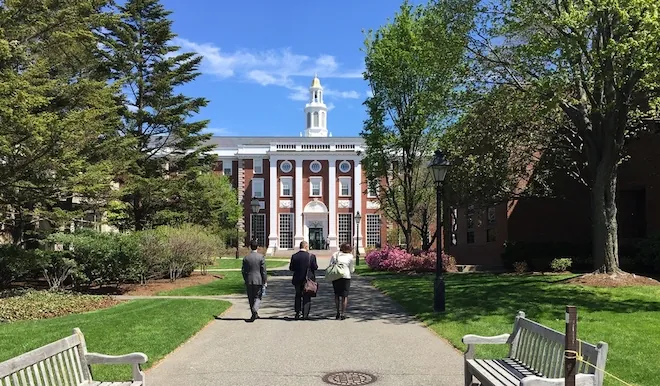
Harvard Business School’s Baker Library.
With just 10 weeks before its first application deadline on Sept. 4th, Harvard Business School today (June 25) revealed a newly revised application for MBA candidates, including a new set of three short essays along with a refresh on how it will evaluate applicants for future classes.
The new prompts?
Business-Minded Essay : Please reflect on how your experiences have influenced your career choices and aspirations and the impact you will have on the businesses, organizations, and communities you plan to serve. (up to 300 words)
Leadership-Focused Essay : What experiences have shaped who you are, how you invest in others, and what kind of leader you want to become? (up to 250 words)
Growth-Oriented Essay : Curiosity can be seen in many ways. Please share an example of how you have demonstrated curiosity and how that has influenced your growth. (up to 250 words)
NEW HARVARD BUSINESS SCHOOL ESSAYS PUT THROUGH BY NEW MBA ADMISSIONS CHIEF
Eagerly awaited by thousands of prospective students and admission consultants, you can bet that the admissions pages of the HBS website were continually refreshed all morning for a glimpse at the new essay. The Harvard Business School essay prompt for the Class of 2027 was posted at 10:30 a.m. with the opening of the 2024-2025 application online.
This year’s change was put through by Rupal Gadhia , who joined the school as managing director of admissions and financial aid last October. A 2004 Harvard MBA, Gadhia came to the school with no previous admissions experience, having been the global head of marketing for SharkNinja robots.
In explaining the change in a blog post , Gadhia noted that “we have refreshed the criteria on which we evaluate candidates. We are looking for applicants who are business-minded, leadership-focused, and growth-oriented…This is your opportunity to discuss meaningful or formative experiences that are important to you that you haven’t had a chance to fully explore elsewhere in your application…Be authentic, be yourself.”
WHAT HARVARD BUSINESS SCHOOL IS REALLY LOOKING FOR IN THE NEW ESSAYS
The school added some context to its new criteria for admission, more clearly defining what it means by business-minded, leadership-focused, and growth-oriented.
Business-Minded
We are looking for individuals who are passionate about using business as a force for good – who strive to improve and transform companies, industries, and the world. We are seeking those who are eager to solve today’s biggest problems and shape the future through creative and integrated thinking. Being business-minded is about the interest to help organizations succeed, whether in the private, public, or non-profit sector. This business inclination can be found in individuals with a variety of professional and educational experiences, not just those who come from traditional business backgrounds.
In Your Application: We will look for evidence of your interpersonal skills, quantitative abilities, and the ways in which you plan to create impact through business in the future.
Leadership-Focused
We are looking for individuals who aspire to lead others toward making a difference in the world, and those who recognize that to build and sustain successful organizations, they must develop and nurture diverse teams. Leadership takes many forms in many contexts – you do not have to have a formal leadership role to make a difference. We deliberately create a class that includes different kinds of leaders, from the front-line manager to the startup founder to the behind-the-scenes thought leader.
In Your Application: Your leadership impact may be most evident in extracurriculars, community initiatives, or your professional work.
Growth-Oriented
We are looking for individuals who desire to broaden their perspectives through creative problem solving, active listening, and lively discussion. At HBS you will be surrounded by future leaders from around the world who will make you think more expansively about what impact you might have. Our case and field-based learning methods depend on the active participation of curious students who are excited to listen and learn from faculty and classmates, as well as contribute their own ideas and perspectives.
In Your Application: We will look for the ways in which you have grown, developed, and how you engage with the world around you.
TIGHTER TIMEFRAME FOR ROUND ONE APPLICANTS
The new essay prompts come nearly two months after candidates to the school’s MBA program would more typically know what was expected of them. Some admission consultants say the delay over the prompt’s release, along with nearly a month’s slow down in releasing application deadlines, is “wildly insensitive” to applicants who will have less time than normal to prepare for the round one deadline of Sept. 4th.
That’s especially true because the most successful applicants to HBS have highly demanding jobs that consume the vast majority of their time. Many candidates go through multiple drafts of their essays to get them as close to perfection as humanly possible. MBA admission consultants are expecting a lot of up-to-the-deadline work this year to help prep candidates for Harvard and other top business schools.
The new application still preserves the post-interview reflection for applicants who are invited to a 30-minute admissions interview. Within 24 hours of the interview, candidates are required to submit a written reflection through the school’s online application system.
REACTION TO THE NEW CHANGE IS MIXED
Early reaction to the change suggests the likelihood of mixed reviews. “This is an uninspired and odd set of questions,” says Sandy Kreisberg, founder of HBSGuru.com and an MBA admissions consultant who closely reads the tea leaves of Harvard’s admissions process. “I don’t know how it’s different from what else do you want us to know about you, frankly,” he adds in a reference to last year’s single essay prompt.
“HBS has certainly moved from the abstract to the concrete,” believes Jeremy Shinewald, founder and CEO of mbaMission, a leading MBA admissions consulting firm. “Some applicants previously felt like they didn’t know where to start and some weren’t sure if they had answered the question, even when they were done. Now, the questions are quite straightforward and all have a cause and effect relationship — one where the applicant discusses the past to reveal the present or future. Smart applicants will understand how to share their experiences and, more importantly, how to relay their values. Some will mistakenly try to whack HBS over the head with stories of their epic feats, but the key isn’t to brag or embellish – the key is to simply create a clear relationship, via narrative, between past experience and true motivations.”
Shinewald found it astonishing that Harvard could not have made the change earlier. “It is, of course, surprising that HBS left applicants on edge until the last minute, all to create very traditional essays,” he adds. “As applicants learn in MBA classrooms, change can be hard and take time. The bottom line here is that these essays are somewhat of an applicant’s dream – they allow the savvy applicant to play to their strengths and draw on their best anecdotes and experiences to create a complete story. Some applicants will lament the absence of a ‘Why HBS?’ prompt, but my guess is that the admissions committee recognized that they would get an almost homogenous collection of essays touting the case method and other well known features. HBS gets some kudos for keeping the focus on the applicant.”
Adds Petia Whitmore of My MBA Path: “I think they reflect one of the traits of this new generation of candidates which is that they don’t handle ambiguity well. So it seems like Harvard had to spell out what they’re looking for way more prescriptively than in the past.”
Some, however, find the new essays a return to the past. “To me, the prompts feel quite regressive, and a return to the more formulaic approach that pervaded MBA applications two decades ago,” believes Justin Marshall, a New York-based MBA admissions consultant. “Because the previous prompt was so open ended, it forced applicants to be introspective and self-aware. You couldn’t just ramble for 900 words; you had to identify themes in your life to show how your personal experiences shaped your values, your leadership style, and your goals. Comparatively, these new prompts are much more paint-by-numbers. Applicants will likely cover the same ground in terms of topic, but there’s very little room for nuance and self-expression. I think it will be harder for applicants with less conventional backgrounds and experiences to differentiate themselves. I’m sure HBS grew tired of reading so many painfully earnest ‘life story’ essays, but I suspect they’ll soon find themselves yearning for essays that have a heartbeat and personality. 250 words just doesn’t allow for that unless you’re a very crafty writer.”
Whatever the case, getting into Harvard’s MBA program is still a daunting exercise. Last year, 1,076 of the 8,264 candidates who applied for admission to Harvard Business School gained admission, an acceptance rate of 13.2%, making HBS the second most selective prestige MBA program in the country after Stanford Graduate School of Business which had an admit rate of 8.4%. Harvard saw a 15.4% drop in MBA applications from the 9,773 it received a year-earlier.
Joint degree applicants for the Harvard Medical School, Harvard School of Dental Medicine, Harvard Graduate School of Arts and Sciences, Harvard Law School, and Harvard Kennedy School must provide an additional essay: How do you expect the joint degree experience to benefit you on both a professional and a personal level? (up to 400 words)
BIGGEST CHANGE IN HARVARD BUSINESS SCHOOL ESSAY IN NEARLY A DECADE
Joint degree applicants for the Harvard Paulson School of Engineering and Applied Sciences must provide an additional essay: The MS/MBA Engineering Sciences program is focused on entrepreneurship, design, and innovation. Describe your past experiences in these areas and your reasons for pursuing a program with this focus. (recommended length: 500 words). Applicants will also be able to respond to an optional essay.
In any case, it’s the biggest change in Harvard Business School’s application in nearly a decade. The last time HBS made a major switch, moving to the essay prompt it just eliminated, was in 2016. That change to just one essay with no word limit and a post-interview reflection was made by then admissions chief Dee Leopold.
When Leopold applied to Harvard as an MBA candidate in 1978, she had to write eight essays. Over her years as managing director of admissions, she first cut the essays down to four and then one, making it optional, and finally the one last prompt with a post-interview reflection, saying that applying to HBS should not be a writing contest .

OUR BUSINESS CASUAL PODCAST: The New HARVARD BUSINESS SCHOOL MBA Application: Fortuna Admissions’ Caroline Diarte-Edwards and ApplicantLab’s Maria Wich-Vila join P&Q’s John A. Byrne to offer applicant advice on how to answer the new HBS essay prompts
DON’T MISS: 2024-2024 MBA APPLICATION DEADLINES or HARVARD BUSINESS SCHOOL WILL NOW UPDATE ITS MBA ESSAY
Questions about this article? Email us or leave a comment below.
- Stay Informed. Sign Up! Login Logout Search for:

Advice Column: Insider Tips For Your MBA Applications

What Harvard Business School Really Wants: How To Ace The HBS Essay

How To Ace The INSEAD Video Questions

Why Are MBA Application Goals Important?
- How To Use Poets&Quants MBA Admissions Consultant Directory
- How To Select An MBA Admissions Consultant
- MBA Admission Consulting Claims: How Credible?
- Suddenly Cozy: MBA Consultants and B-Schools
- The Cost: $6,850 Result: B-School
Our Partner Sites: Poets&Quants for Execs | Poets&Quants for Undergrads | Tipping the Scales | We See Genius

IMAGES
VIDEO
COMMENTS
"Why do you want to pursue an MBA?" essay is one of the most common supplemental or optional essays. Whether you are looking to apply to Harvard Business School or the Kellogg Business School, you will need to prepare to answer this question via essay or an MBA interview question.. Some schools may indeed state that the essay is optional, but any serious candidate would be well-advised to ...
3. Get Vulnerable. Most MBA admissions essay prompts are written with the goal of getting to know as much about you as possible in the shortest number of words. To do that, you're going to have to share real things from your life — to get personal, intimate, and vulnerable. Do not shy away from this.
There are five steps to writing an awesome Why MBA essay: Identify Your Reason. List out Relevant Work Experience. Decide Which Skills You Want to Highlight. Draw Up A Skeleton. Flesh it Out, Edit & Finalize. 1. Identify Your Reason. The most important part of writing the SOP for MBA is having a clear picture.
Goals Essay. When answering a question about your MBA goals, it is crucial that you are decisive. While no one will hold you to what you write in your MBA applications, you should have a specific post-MBA plan. For most schools, you will want a short-term and a long-term career goal. This goal should be logical for you.
From the Past. First, ask yourself why you made the choices you have so far. Write out some of the most impactful decisions in your life and what they show about your values and aspirations. Think about common themes and patterns that connect the different points in your work experience and educational journey thus far.
The "Why MBA" Essay is your chance to convince admissions officers that their school is the perfect fit for what you are looking for in an MBA program. The best essays are both personal and specific. ... First off, MBA admissions officers tend to use the "Why MBA" essay question as a test of your decision-making abilities and your ...
The 'Why MBA' Essay Answers specifically provide the admissions committee with a detailed understanding of your reasons for pursuing an MBA, your career objectives, and how an MBA from their school aligns with your goals. This essay also signals to potential employers your readiness and fit for the business world, underscoring the ...
1. Communicate that you are a proactive, can-do sort of person. Business schools want leaders, not applicants content with following the herd. 2. Put yourself on ego-alert. Stress what makes you unique, not what makes you number one. 3. Communicate specific reasons why you're great fit for each school.
Here are five tips for compelling essays that will stick in the minds of the admissions committee and help you get into your top choice business school program. 1. Stay focused and answer the question asked. It's surprising how often candidates write beautiful essays but do not answer the question. While I certainly endorse thinking outside ...
These tips will help you craft the perfect answer. 1. Describe your specific career aspirations and your reason for pursuing an MBA. This may be the most important essay question you tackle. You must convince the admissions committee that you deserve one of their few, cherished spots. Reference your background, skills, and career aspirations ...
But you can still improve your odds of creating an essay that you're proud of, if you follow these simple tips. Here are 6 steps to writing an impressive MBA essay. Start early. Understand the MBA essay prompts. Demonstrate your fit with the MBA program. Stick to the word count.
Feature the traits and tell the stories that depict "you" at your best. 2. Sample MBA essays can undermine your confidence in your MBA candidacy. The essays that get published as samples are often truly eye-catching, dramatic, and sensational - stories of exceptional accomplishment, rare feats, or extreme obstacles.
A good essay can help you gain admission to a top master of business administration (MBA) program. But writing one can be a challenge. Most business schools require an essay for admission to an MBA program alongside other requirements like undergraduate transcripts, letters of recommendation, and, sometimes, admissions test scores. An essay allows you to emphasize your experience and helps you ...
Some MBA essays are open-ended, requiring applicants to formulate more strategic or creative answers. Other prompts ask applicants for more specific accounts of their experiences or ambitions. Often, essays are variations of similar questions regarding leadership, personal growth, and career goals. Prompt 1: Our students share a desire to ...
Unlock the expert tips for crafting impeccable MBA essays. Explore the significance of these essays, revealing your personality and motivation. Learn about the various essay types, from 'Why MBA' to 'Leadership' and 'Community Contribution.' Follow our step-by-step guide to create standout B-School essays, and discover valuable tips to tackle the 'Why' MBA questions. Don't miss the 10 common ...
First, MBA admissions committees want to see how you write. Communication skills—including concision, clarity, style, and fluency in English—will be essential to your success in business school. One way of discerning your level of writing ability is to require an original writing sample. In an MBA essay, you have to get your point across ...
Calculating your MBA Odds and determining your school fit are two totally different things. Step 1: Show the admissions committees you're going to business school for the right reasons. Step 2: Show schools you've really done your research. Step 3: Show them you'll leave the place better than you found it.
2. Not Reading the Essay Question Closely or Misunderstanding the Question. To answer MBA essay questions correctly, understand the question fully. Misreading it can result in an off-target essay and a rejected application. To fix this, find the keywords in the question to understand what the admissions committee wants to know.
Below, Personal MBA Coach shares the required essay questions for all of the M7 schools, as well as some quick tips for how to respond successfully to these top MBA program essays! Stanford GSB Essays. Number of Required Essays: 2. Essay 1: What matters most to you, and why? (650 words suggested)
MBA Essay Questions and Answers. Many of the top business schools use MBA short essay questions and prompts as part of their applications. The MBA essay is different than the MBA statement of purpose or MBA personal statement, which both focus on your personal motivations and future career goals. Most MBA programs provide specific prompts for the MBA essay, with questions curated by the ...
It helps to think of your entire application (the app, essays, resume, letters of rec, interview) as part of a single piece. That piece needs to answer the question of Why MBA, Why Now, and Why You all together. Use your short answer questions and essays to share the same story and have a definite feel or point to the whole thing.
Essays help us learn about who you are rather than solely what you have done. Other parts of the application give insight into your academic and professional accomplishments; the essays reveal the person behind those achievements. Essay Questions. We request that you write two personal essays. In each essay, we want to hear your genuine voice.
3 potential ways to tackle the question. You have the 'magic' work experience years count. As per some research we've done in the past, most GMAT based MBA programs have an average experience range of 4-5 years, give or take (at the time of joining the program). So, if you are near this average, then the explaining required is a tad easier.
Harvard Business School is asking MBA applicants to answer a new essay question. It's the first major aplication change in nearly a decade. Toggle navigation. ... Joint degree applicants for the Harvard Paulson School of Engineering and Applied Sciences must provide an additional essay: The MS/MBA Engineering Sciences program is focused on ...